#Which is a wild thing for me to conceptualize as a person who's grow up with this guy always just like... Doing his thing in the background
Text
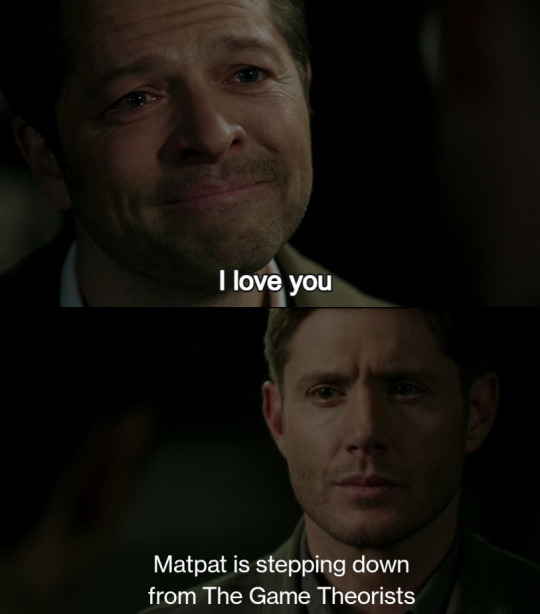
#The video was actually really heartwarming and I'm ngl I cried a little bit#Like damn... That guy was a lot more integral to my later childhood than I thought huh#It took me second to realize#But like I started watching him when I was EIGHT#I'm FULLY an adult now#thats.#Idk that feels like a lot#He's never been perfect#But I'd actually started watching him again recently and I've noticed#he's. Grown#Not like as noticeably as I have in the past decade#But he's definitely more... Himself.#Which feels like a weird thing to say right? But it feels true. And yeah he's a clown#And I don't agree with or even like all of his content even now#But he's so much more at ease with his 'overzealous internet clown who makes cringey dad jokes and is generally a menace' nature that like#It's actually fairly entertaining to watch#Anyways I think Im actually excited for the future of his like... Work outside of the theorist thing#Which is a wild thing for me to conceptualize as a person who's grow up with this guy always just like... Doing his thing in the background#But yeah#I am#Wild stuff#matpat#game theory
0 notes
Text
It absolutely kills me that Deku is never shown thinking about the river scene, he thinks they just began naturally drifting apart when he didn’t get a quirk, but for Kacchan it was this whole story of betrayal & never ending mockery to /him/ 💀💀💀
Like that’s the thing about the bullying that gets me and the antis always seem to miss, Kacchan legit thought the hate was mutual and that Deku was constantly and consciously making underhanded slights at him for the last 10 years
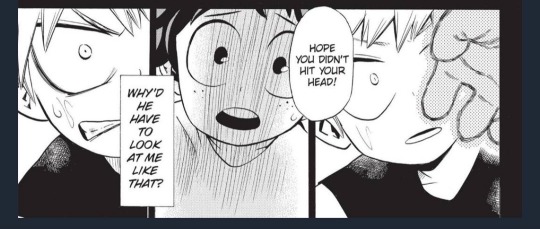
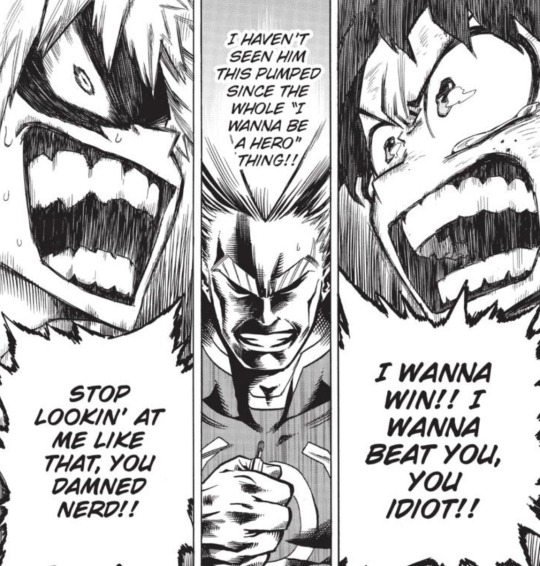
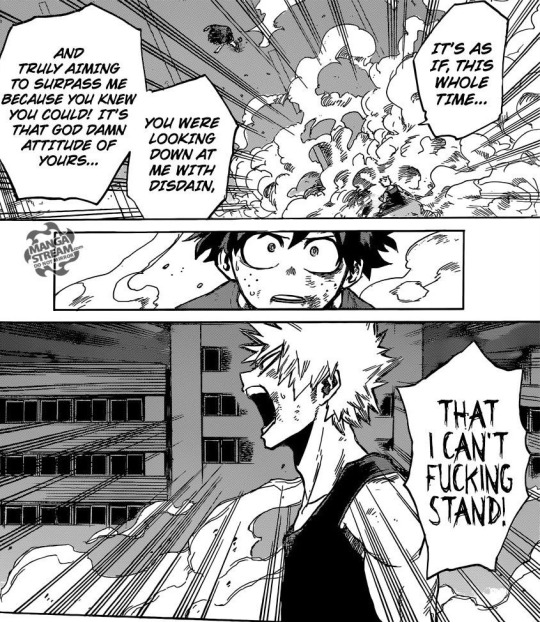
Bk legit lost sense of reality at 5 and didn’t clock back in until 15
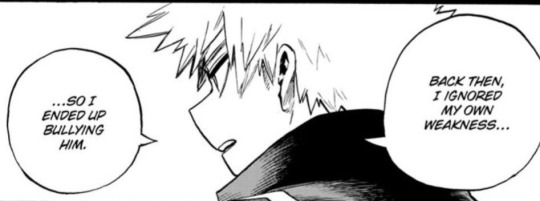
5yo him couldn’t tolerate the idea that he may not always be the best at things, kindness/empathy is a strength(one he struggles with), & that a helping hand is not something you necessarily have to need or deserve to accept
And that intolerance was reinforced over and over again by the continued praise and lack of constructive criticism from the adults around him, the envy & admiration his peers held for him, and from the ridged criticism of his parents
But Deku challenged all of that everyday by merely existing. Empathy & kindness come as easily to him as breathing, they’re obvious strengths coming from him.
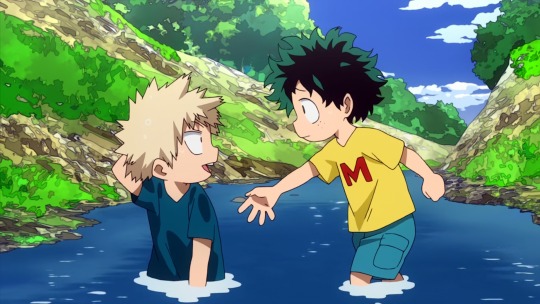
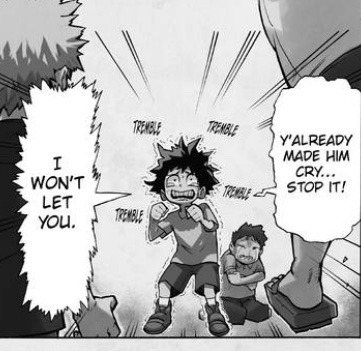
His ability to put himself in another’s shoes strengthened his ability to think outside the box, come up with clever ideas, and desire to help others at any cost to himself
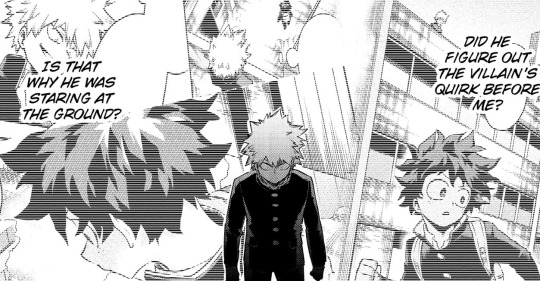
Remember Deku knew full what he was going up against with the sludge villain
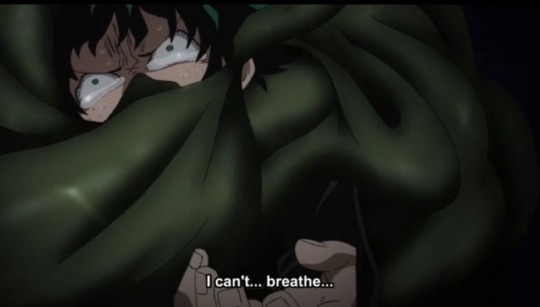
He’d already barely survived an attack from them, received no medical attention for it, went jetting over skyscrapers, had his dreams crushed by his idol after a lifetime of having them mocked
And his feet still managed to not just move but doge 6 pros, then he came up with a successful plan of attack to hit a moving target
Because unrecognized by everyone but Kacchan, Deku was trying to be a hero, it wasn’t just a wild dream, he had made efforts
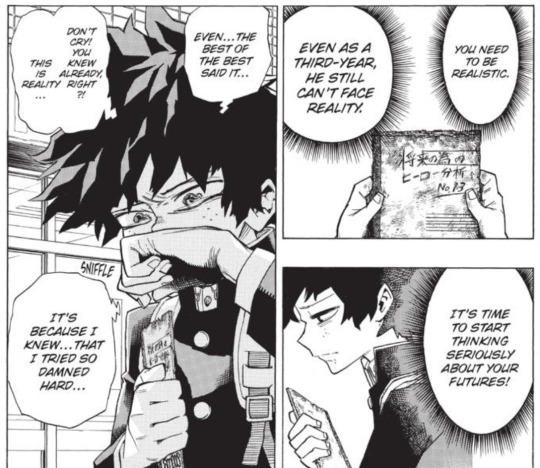
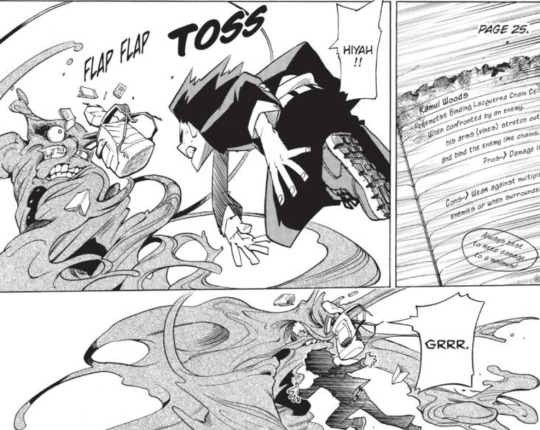
But what was passive unintentional challenges on Dekus part were taken by Kacchan as direct threats to his greatness, which is just absolutely wild, love that for him
Kacchan is the drama, he is the problem, but he manages to do something very few people ever accomplish, he gains self awareness!!
Do y’all realize how rare that is?? So many people will let their capacity to hold onto multiple complex thoughts pass through their fingers and never have it fully develop
As we enter our teen years we gain the ability to simultaneously hold a focus on the future, workshop our personal goals, and questions the beliefs and behaviors of the adults around us in full nuanced ways for the first time
But many take the path of least resistance and don’t stretch their minds and push the boundaries of those new skills to workshop their position in those systems
And when we don’t that skill stagnates & grows weaker with time, it takes a lot of intellectual prowess to conceptualize all those moving pieces
You have your actions, theirs, your beliefs, what you’re able to gather as their beliefs, the nuances of societies beliefs and how they influence you and them, and circumstances in and out of y’all’s control
Then you have to add all that up, walk it back from their point of view, and then see if adds up the same
Kacchan was 15, spent 10 of them totally delusional, and still managed to rewrite his whole narrative in a years time
I know grown as adults in the mental health field who struggle to do that on a much smaller scale
Disclaimer: this isn’t an excuse for Kacchan’s previous behavior being unkind and violent is still not okay, I just find it very interesting and impressive how his development works and the added nuances about how he thought him & Deku were on similar pages but where actually light years apart
#my hero academia#mha#bnha#boku no hero#bnha bakugo katsuki#bakugou katsuki#kacchan#deku#izuku midoriya
183 notes
·
View notes
Note
Alright, most colds last a few days, so if you are still wanting things to poke at:
Halsin as a druid (and a person) focuses a lot on nature. The "nature outdid you" line in reference to beauty.
Here's the thing though: eventually both he and Ballard have to realize our beautiful boy is at best preternatural. I also don't think he'd be actively transphobic, but I can see that adding a layer of perhaps active skepticism that tends to come up when cis people deal with the concept of self for us. (He's also got some strong binary thinking for nature vs not nature re: cities.)
Which is basically a long-winded way of asking how Halsin's view of Ballard changes as more info happens.
I've been stewing on this for (checks timestamp) four weeks now and I'm still so ajdjdalsdlaj about it. I've been frustrated about it for a couple of reasons--foremost that I really like Halsin as a character, and it's been challenging to think of him more critically, but not insignificant is that it feels like the Halsin we see in-game has had a LOT of context shaved off him with a little bitty pocket knife. Whittled down, as it were! In terms of cut content it feels like he's definitely lost a lot of character nuance, the source of his guilt about the shadow curse, the reason for his dissatisfaction as arch-druid, the conflict between his solitary wild shape and the role he's been forced to take in his community, etc etc. I think in game Halsin has stellar communication skills and an admirable sense of priorities, even in terms of stepping away from the Grove. It's difficult to ascribe weaknesses or blind spots to him as a result!
(kind of besotted, I am aware, it's fine, that's why I imprinted more on messy Gortash as a love interest)
So I am going to talk about a couple of different ways of conceptualizing 'nature', and which end of it I think Halsin comes down on.
The first take on nature is that how you were made is the be-all and end-all. This is the one I am most familiar with, and shoot me if you've heard this before but this is the Catholic idea of it. Your nature is immutable and permanent and defined for you from day one! God's plan, fate's plan, these are truths that cannot be fought or hidden from and all of your actions will only bring you back into their path. This is such a good bed for tragedy to grow from--this is what happened to Oedipus, where multiple people's fear of and attempts to escape from a prophecy are the very things that bring it about in the end!! There is a satisfaction to that kind of tragedy, but that's all this idea of nature can be, in my mind. Foregone conclusions of doom.
On the other hand, the idea that your nature is contained within you and can only be expressed by you, and is constantly changing according to it's surroundings--it is the nature of bears to hibernate, it is the nature of foxes that turns their coats white in winter, it is the nature of salmon to change beyond recognition as they approach the spawning beds. Nature IS change, and to fight change is unnatural; to assume someone else's change is incorrect because it does not match your previous notion of them, or match YOUR internal changes, is wrong. Very obviously I think this is where Halsin would come down on it! With all of the ways that nature changes, up to and including the non-existence of binary sex, I just can't believe he would be anything less than serenely approving of being trans.
Much more likely, I think he thinks that being trans is cool and hot as hell and is super into it (the vibes I get are not chaser, to be clear--but there's a type of person who is just VERY excited to see tangible examples and proof of you having taken direct control over your physical form, you know? Halsin sees bottom growth and goes cuckoo bananas, Halsin gets a handful of little puffy nipple titty and implodes, imo. ally.)
Now, theoretically, this also applies to the idea that a bhaalspawn can change and is not bound by their birth--and in theory I think Halsin definitely would say he DOES think people can better themselves. Faced with the reality, that Ballard doesn't actually think he should stop killing people and just wants to be in charge of when he does--faced with the reality of Ballard's past and that he doesn't necessarily regret it--I do imagine even Halsin 'close my eyes real hard when something confronts my beliefs' might struggle. Again, having not played through the entirety of Act 3 or decided exactly what Ballard's end game is.... there's a very real likelihood of a falling out happening there as Ballard struggles to figure out self determination, but if they break ways I think Halsin and Astarion find solace in each other, Ballard having forged that V and put the work into seeing what the final leg of the triangle would look like.
#asks#character meta#halsin#ballard#i like halsin a lot i rly rly rly do i just wish we had more of his actual story so I could decide whether or not he is a man of conviction
12 notes
·
View notes
Text
7/29 - 8/6/2023
I started last weekend really excited about writing Renji 2, and had a good time with that. And then proceeded to have no writing time past last weekend. =_= I just need to chill out and accept that life is going to be about driving and People and racecars and the Women's World Cup rn and not about my blorbos and stories. Not that I don't also like the aforementioned but also MY BLORBOS AND STORIES THO. ):
As excited as I am about this chapter I'm still not sure if it ~works because Renji is just infodumping about 79 different things, and the part I wrote was about written vs. actually-followed easement policy in West Rukongai and how long it takes to run places. Which on one hand, Renji Why, but on the other, Why Not, Renji.
Something I have done a lot of this week, though, is driving—more in the last 7 days than in the last 7 months, to be specific—and I got reacquainted with my nemesis, audiobooks. I still don’t think I actually like audiobooks, but all of the books I listened to were very enjoyable in spite of the format, and I recommend all of them! This is especially exciting because these choices were guided by "what is currently available at the library."
The week’s roadtrip audiobook selections:
H is for Hawk, Helen MacDonald (2014)
Psalm for the Wild-Built, Becky Chambers (2021)
Orange World, Karen Russell (2019)
The Nickel Boys, Colson Whitehead (2019)
H is for Hawk, Helen MacDonald (2014)
I’ve been wanting to read this book for a long time, but I’m glad I didn’t get a chance to until now, because coming off of condor!Tobiume this book was especially exciting. I didn’t realize until listening that it drew so heavily on The Once and Future King (and TH White’s biography in general) as intertext, which has really made me want to re-read that book, since I haven’t read it since the summer after I graduated high school. H is for Hawk is a falconry memoir, and it is quite a bit about birds—the goshawk Mabel in particular—which I figured would be a good time, from a creative nonfiction, ecology writing POV, two genres I generally like. But oh my god it is so much better than I already thought it was going to be! MacDonald has such strong analysis of masculinist, neoliberal cultures past and present, and the kinds of mythologies falconry comes from with regard to class and gender (and sexuality, re: TH White), and her own parsing of these things as she grows up. I want to read this book again.
Psalm for the Wild-Built, Becky Chambers (2021)
I am OBSESSED with this book and I keep recommending it to everyone I see. It’s about a tea monk on a future moon where, in the distant past, robots developed to work in human factories gained sapience and left the human places to go live freely and separate in the wilds. Yearning for something missing from their life, the tea monk sets off into the wilds and encounters a robot who has been sent out to check in on the humans, and to answer the question, “What do humans need?” I don’t know that I am usually a robot person—but I am a traveling tea monk person haha—but I love these robots so, so much. They name themselves for the first things they see, so they all have plant/animal names. They hyperfixate on watching stalagmites grow, for centuries. This book is so soft and thoughtful and incredibly thought-provoking. It’s about a future that doesn’t rely on post-apocalypse; nothing overtly dramatic happens but everything is gripping.
Orange World, Karen Russell (2019)
This is collection of short stories—I was able to pay attention to some far more than others, but Russell had the most interesting prose for me. There were lines where I was like, man, I wish I were reading this so I could copy this down.” Really strong sense of region and place in each story, and the world building (as one might hope of a book titled Orange World) is superb. I was familiar with Russell conceptually but hadn’t read anything by her before. My favorites were the story about Plains State/Midwestern storm farmers, who captured, husbanded, and rented out storms of various stripes—and now their industry was being affected by climate change. And the story about four sisters who are gondoliers, and use echolocation (of a sort) to navigate the span of a short story.
WIP-wise, I guess LOL I’d love to write as beautifully as Karen Russell does!! But more seriously I guess it’s about being bold about the mechanics of a world and how much it is possible to accomplish even in the span of a short story.
The Nickel Boys, Colson Whitehead (2019)
I’m only halfway through this one, but it’s historical fiction about a reform school in the South during Brown v Board of Education, and the false promises experienced while attempting to integrate the South.
As far as where this could be WIP research, Whitehead does a great job of minor timeskips across the parts of the novel, including skips of actually writing out major precipitating events, which makes me feel more embolden about how I’ve structured some of this WIP.
7 notes
·
View notes
Text
saw a kingdom hearts reaction where the person said kingdom hearts is about childhood and growing up and losing innocence, and childhood trauma
and like 1 yeah they hit the nail on the head. it makes you feel like a kid again, but also reminds you that life is heavy and complicated and these things that remind you of an innocent time before it all will always be touched by the present now that you are no longer naive and now that you’ve started your journey into adulthood (like Sora leaving the islands). it reminds you of what you miss, of what you hope for, some of the most impactful lines in kingdom hearts 2 are when hayner says (and axel reaffirms, and truly so Many character stories echo) “we can’t be together forever, it’s not about how often we see each other, but how often we think about each other. as long as we have each other in our hearts then we’ll still be with each other” those ideas i think most people eventually will relate to. so much of the kingdom hearts story is about best friends, making friends, valuing friends, and how the world and the passing of time pulls people apart. how to stay close to them, how to get back to them again, how to grieve when we can’t, when we don’t know the future, how we have to move forward every day because life doesn’t stop, the circumstances tomorrow are not guaranteed to be like they are right now this minute, and we have to cherish what we have while it’s here. hold onto it in our hearts when it’s out of reach, and try our best to remember it and what it’s done to change us forever. every friend we make is a part of us, every precious memory changing us and our entire lives even when the connection gets lost or strained, even when our lives change completely in ways we could have never predicted or stopped. the desire to keep things as they are forever, when they’re good and we have our loved ones, and how as much as we may want that and strive for it and sometimes do achieve it life is going to constantly surprise us and we can’t control what tomorrow will bring. “hold me, whatever lies beyond this morning is a little later on, regardless of warnings the future doesn’t scare me at all”, “when we get older you’ll understand what i meant when i said no things aren’t quite that simple/things Are Quite that Simple.” Utada Hikaru’s absolutely lovely main songs have lyrics which really hammer home the themes of kingdom hearts.
just. yes on one level its an absolutely bonkers crossover visually, conceptually, in execution, in experimenting with combat and combination, and it’s wild it got made because who knows if it even could’ve existed if someone tried to make something like this today in the 2020s. but also it does have a heart at the center of it, an emotional thread that connects to everyone growing up and who already has, and it hits you right through to your core and it’s the reason the endless tragic arcs of the characters make so many people bawl their eyes out. yes its a sad story, many sad stories trying hard to fight to get a happy ending and reunite with their friends again one day. but its also a really, really, simple story. its a story we all go through. its covered in all these words like darkness, hearts, light, etc and this bonkers lore nomura keeps intensifying and piling on. but at the core of it all kingdom hearts is about our friendships and loved ones, about growing up and the passage of time changing everything, and how to bear it and go through this endless journey we’re all on. it hits extra hard to some (like me) because the childhood disney and final fantasy elements remind us of exactly when this reality starts to set in for us growing up, we were children, often surrounded by friends and family, and then one day people moved and died and school was over and nothing was ever stable again in that sort of concrete childish way when the world is only as big as your backyard and childhood home (like Sora, Riku and Kairi the world is only their tiny play island - they know nothing else, never had to be apart, and they wonder what’s out there... and we all find out eventually in life what’s beyond that small initial world we had). that’s the part of the story that hits.
and then like i said, 2 she mentioned its about trauma and childhood trauma. i’m burning out of steam here but that streamer absolutely gets it. 358/2 Days is about 2 children who are raised by a cult (which is also a toxic workplace - oh no childhood home of safety they start out already in a workplace nightmare where their work is their entire life and they’re easily replacable if they aren’t “productive” and their entire existence depends on being valuable to the boss, they’re disposable, they’re told their feelings and wants don’t matter and YET they develop them anyway and DO find each other to love and make life bearable. they do make a family out of their friends, people they want to live for, live to see, love to have in their lives, people and connections that matter more than their job). 358/2 Days is about adults who once had lives they loved and valued, people they cared about (Axel and Saix being particular highlights of that), who were crushed by their jobs and the passage of time destroying their old lives and old safety, the whole world fell apart on them and they died and all that’s left of them are echoes of their old selves who grew apart, now adults and part of the very kind of system of adults destroying things that once upon a time destroyed their old world and old lives. Axel knows the reality that he’s a part of the destruction, and yet when he connects to Roxas and Xion he wants to badly for them to NOT lose their loved ones and precious lives they care about. To NOT be crushed by the very awful situation they’re in, to help them, to try and protect them but knowing in the way he knows because he’s been through it... that they can’t be saved, that time will pass and change things, and he thinks the evil he does is better than the worse alternatives he knows could happen. And they all break apart. And i think a lot of older people can see younger friends, younger loved ones, children they have, going through their own versions of these things. the naive idealism of childhood, of the safe world they’ve managed to have or carve out or temporarily found, and the looming awful reality that there are things out there that can and do destroy that ‘safety’. that nothing is guaranteed to be forever. you’ve got traumatized adults who already went through awful stuff, children being traumatized who can never find real safety and will eventually have even that ‘good thing’ thrown into danger they can’t stop. Riku, Sora, and Kairi went through their own version in kingdom hearts 1. Riku wanted to see other worlds, wanted to protect the friends he loved from all the looming dangers he figured ‘might’ be out there because he was older and growing up and realized before Sora and Kairi that their safe haven might not always be safe forever. He leaped without looking, and got into danger over his head and instead of learning about it so he could protect sora and kairi, he ended up damaged by it first and used by it as a tool to hurt his own loved ones. and so many of the kingdom hearts games explore this idea. Ventus, Terra, and Aqua also have a situation with 2 of them young adults trying to pass their exam that proves they’ve ‘graduated’ to adulthood, aware of the real potential danger and impermanence of the world in a way Ventus the younger kid whos still a teen is not. And Aqua and Terra go out trying to protect those they love (and the whole world from being hurt by the same things), and instead get used, instead even when they try their best it’s not always enough. Though it is enough to one day find each other again, to help some people on different worlds even if it’s not going to be their own loved ones for a long while, and so it was worth the effort. Their only options were to stay on their isolated world and be attacked one day by the reality of time passing, or go out, and no one will ever be ready for it. No one’s ever ready to grow up, no one can stop it and we’re all forced to go through that journey someday. And Ventus - he already comes to the world damaged, traumatized, already forced through pain despite his young age, already forced to have been used. In kingdom hearts, they just do not sugarcoat this. Ventus (in BBS) didn’t have any safe childhood or loved ones to cling to originally, he was alone and suffered and sometimes children do, sometimes any person does. He eventually does find a respite - a sanctuary with Terra and Aqua living with them, that he treasures and has made into his home. Axel makes that as an adult, Ventus makes that as a teen, Sora and Riku had that with each other since children. (I could probably argue somewhere in there that Eraqus and Xehanort once were each other’s home, sanctuary, and their growing up also meant that was lost and longed for one day again some how which is maybe why KH3′s ending made me cry despite me thinking i didn’t care about those two characters lol). My point is plenty of the characters are traumatized before and as the stories kick off, or through the stories, and i very much feel people who consider it a major theme of kh.
8 notes
·
View notes
Text
Sexuality and Being Wholesome
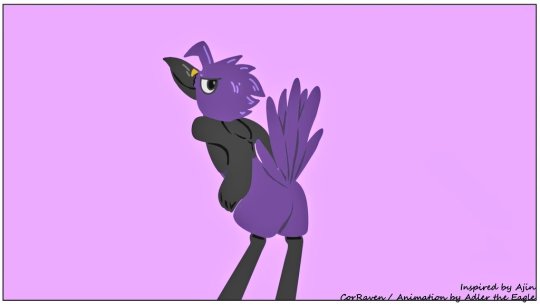
[Art by Adler the Eagle]
Adler the Eagle is an amazing individual who many are inspired by. He and his husband produce adorable and thoughtful content on YouTube and are one of the elements in the fandom that I would quickly point to when asked; "What's so great about being a furry?"
However, Adler is both a character and themselves. The actual truth is, they are only themselves, but they are so charming and naturally charismatic that people percieve them as being a troped up character. No. Adler is just a kind and loving individual with a full spectrum of thoughts, emotions, and desires just like you and me.
This apparently created some growing pains when fans of theirs branched out from just seeing their YouTube content to seeing them interact on Twitter and express their sexuality. This apparently broke down some preconceived notions and garnered a few unkind comments which resulted in Adler responding like this:
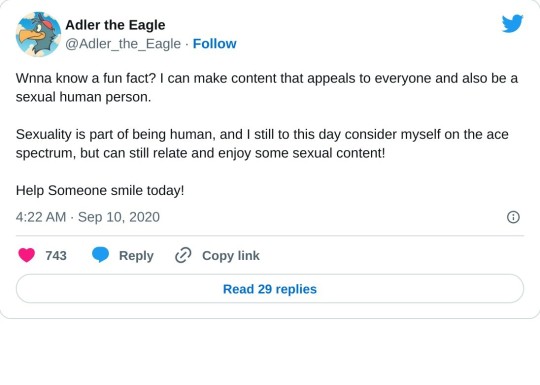
Just. The best. Possible. Response. 💜
This is a recurring theme with content creators across the internet. From Markiplier to Jaiden Animations, Adler to Imkrisyim. Each of these creators have had their own well done method of dealing with their consumers hyperfocusing on their sexuality. Markiplier did a nude calendar and donated the proceeds to charity, Jaiden addressed it once and shut it down, Imkrisyim got lots of porn drawn of themselves.
Everyone mentioned above are fundamentally wholesome and positive content creators. Something I strive to be, myself. When you watch my videos or streams, read my tweets or Tumblr posts, I want to be a comforting presence, to make you laugh and smile, to affect you positively and combat the woes of everyday life. I am also an adult living in a world with a wild variety of sexual expression that I engage in and proudly share. This has caused some confusion with recent followers who have been surprised to see me talk so openly about sex.
To a degree, I get it. I don't post porn openly, I can go weeks without a sexual topic on my feed. So let me break it down for you. I am one person, Cor. But I also portray another character; @yrieshadow, on streams and social media. Yrie was designed and meticulously thought out and continues to be developed upon. In fact, during the creation of Yrie and conceptualization of how I wanted to market them I addressed exactly the issue of others' sexualizing them.
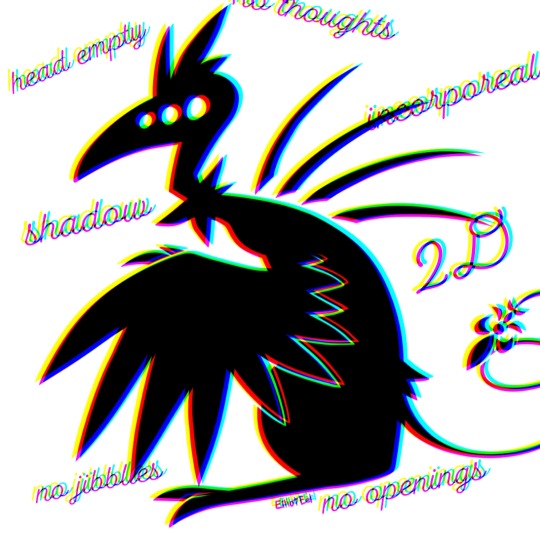
Canonically; Yrie is ace, aloof, genderless, and unconcerned. They're a shadow. They've got no reproductive organs, and no desire to see your penis, even if it does look like an isopod. Yrie has no concept of sexuality beyond knowing that it's a thing that living creatures do. They get flustered when flirted with out of confusion, disdainful of sexual advances out of impropriety, and alarmed when exposed to lewd material. These are all chosen character traits. Yrie is a portrayed character that I have spent a significant time in the headspace of, deciding how they would feel about things that mortal creatures did. Obviously Yrie is not an entirely unique character portrayal. Who I am is largely represented through Yrie. My beliefs, feelings, and experiences all bleed through and become a part of the character. Yrie is a shadow of myself. A silhouette of the corporeal me, but only marginally.
On the flipside, I, CorRaven, am not a character. The purple raven you see before you is a digital representation of who I am. My real thoughts, my real feelings and my sexuality. I'm horny. I speak openly about sex and sexuality. I encourage dialogue and learning, sharing experiences and stories. I see sex as a fun social activity and romantic bonding experience.
This creates some confusion when people who have known me as Cor, know how overtly sexual I am; join my streams and talk to Yrie as though they are talking to me. You're not going to get the same responses! Yrie will be confused and not know what the fuck you are talking about. An actor doesn't take off their mask during a performance just because their buddy is in the audience. If you flirt with Cor, you're going to get appreciation and encouragement. If you flirt with Yrie, you're going to be met with nervous confusion. Both exude wholesomeness.
Despite these details being carefully thought out, I still face issues with followers trying to impose their own values on me, which brings me to my point; consumers don't get to decide the nature of the content that creators make. Your reactions have influences, obviously. You matter. But the creator gets to decide who they are and what their message is. Adler handled this situation perfectly by resetting expectations and continuing to simply be themselves. They didn't change who they are just because some people are under the puritanical perception that sexuality and wholesomeness should be mutually exclusive.
It is ok for your favorite creators to be sexual beings and to express themselves as much or as little as they want. How ever they choose to do this.
There will be a follow-up topic that we'll visit another day, but I'll present this to you now; The opposite-same issue. Please do not impose yourself or your sexuality on others. People don't want to hear about your fantasies with/of/about their characters. Just because I encourage sexual expression does not mean my legs are open to you. But again, this is a topic deserving it's own post.
5 notes
·
View notes
Note
Do you have a rant in you about Emeril Lagasse like you do about Bobby Flay?
I...hm. I think in a way I both have no rants and also three rants, when it comes to Emeril Lagasse.
The Rant That's Actually About Bobby Flay
All these TV chefs, particularly those who came up in Food Network when the food-entertainment field was super regulated and gatekept, you really only know what you see of them directly and what you might hear about them from other sources. They're not like regular celebs where a huge chunk of their lives is public and covered in gossip rags and such. Not to make a rant about Emeril Lagasse into a rant about Bobby Flay, but the reason I have a rant locked and loaded about Bobby Flay is that he's shown his ass in public enough for me to decide he's not someone I'd want to hang out with, even considering the above.
It's kind of a self-selection sort of deal. Because while I like food tv I don't watch much of it and haven't for probably like 15 years, you have to have been somewhat egregious, like Flay or Batali, to draw enough of my ire that I have a rant. (I don't actually have a rant about Mario Batali, I'm too scared of Eataly to try it and otherwise all I know is that he's a serial harasser.)
2. The Rant That's Actually About Fatphobia
My immediate thought when I got this ask was "I haven't thought about Emeril in years, oh man, did he do something awful?" but a quick goog and the worst I could find was that while liking Barack Obama he didn't like his attitude towards regulatory legislation. Which, you know, in the scheme of things lately is a pretty minor issue. Not that I think you're taking a personal swipe at him, but culturally it seems that as with Guy Fieri, Emeril Lagasse's cardinal sin is that he is
a) A loud personality
b) In a fat body
c) on television.
And my patience for the confusion of "tacky" and "fat" and "bad" is growing very, very thin. Especially since Emeril and Guy are the rare people who could be fat and because they have pretty wild personalities still thrive in the modern YouTube-TikTok era of food entertainment, where conventional attractiveness and thin bodies are pretty much prerequisites for fame of any kind. If you are fat on video today you truly have to be exceptional in some way and working twice as hard in order to have any success, let alone the kind of success top influencers have.
If Guy Fieri as an unknown today did what B Dylan Hollis does, he would not get the reaction B Dylan Hollis gets. No beef with Hollis, work what you've got, but if Hollis was fat he'd be at best the butt of jokes about how he'll eat anything, and the worse TikTok makes fatphobia in this country the less patience I have for it. Emeril, who also looks Faintly Ethnic and puts an emphasis on Portuguese and Creole flavors and techniques in his cooking, might very well just simply be ignored.
3. The Rant That Isn't Actually A Rant At All
Here is my memoir about Emeril Lagasse: my mother discovered Emeril's first show, Essence Of Emeril, when I was in my middle-teens; she saw it on some hotel TV while traveling, and brought it back to the family, and we all really enjoyed it. The idea of a chef having a specific spice blend or a food brand was either very new or wholesale conceptualized by Emeril, with his Essence Of Emeril spice blend, which was posted as a recipe as well as sold in stores, so you could make it at home fairly easily. It was still relatively unspicy; I could eat it, and my brother was obsessed with it, which made it a pretty useful foodstuff in our household. Our constant struggle to get my brother to expand his palate so we weren't cooking him an entirely separate dinner was real, and Essence helped with that since he'd sprinkle it on food he wouldn't normally eat, like spaghetti noodles or baked fish or porkchops, and then happily eat it.
So I have perhaps understandably fond memories of Emeril, because he was something the family agreed was enjoyable, and his recipes (while often complicated) produced pretty delicious food.
There's actually a moment in Infinite Jes, when Eddie's talking about his career, where I touch directly back to me being a fan of Essence Of Emeril and watching him make the leap to Emeril Live.
If you watch Essence of Emeril, it's your standard Chef Behind A Counter On A Soundstage show, very Julia Child -- he's boisterous and enthusiastic and he's already honing his "Bam!" schtick, but there's nothing for him to work with. He hasn't got an audience and it's almost painful to see now because you can see where he unconsciously reaches for an audience reaction. It's a relief to watch early Emeril Live because he's got a studio audience, someone to respond to, someone who reacts when he makes a loud noise or finishes a beautiful dish. I put that moment into Infinite Jes, where Eddie's trying to make a dumb little fun cooking show in college and doesn't really "break" until two stoners walk into the kitchen and he's got other people to bounce off of. In some ways, because I watched way more Emeril than I did Guy at a formative moment, Eddie's actual career owes more to Emeril than to Guy.
I think Emeril's had a rough go of it in the past decade or so; you don't hear about him much, and part of the reason is that a lot of his business ventures haven't done well. He sold most of the remaining ones to Martha Stewart and lately has focused on his restaurants, as I understand it.
In conclusion
So yeah...the only rant I have about Emeril Lagasse is actually a rant about fatphobia, I guess; if it turns out he's like a super vocal Trump supporter or something that'll be a tragedy (and given he's based out of Florida, it's not unlikely he could have uncomfortable shit to say about the pandemic, but as far as I can tell he hasn't). It seems without in-depth research that he's a decent guy whose time has somewhat passed, and who decided to focus on what he enjoys about being a chef over doing stuff he doesn't like because the money's good.
160 notes
·
View notes
Text
the many faces of tom riddle, part 4
-attachment, orphanages, and yet more child psych: time to add yet another voice to the void-
FULL DISCLAIMER THAT THIS IS JUST MY OPINION OF A CHARACTER WHO DOESN’T HAVE THE STRONGEST CANON CHARACTERIZATION, AND THUS ALL THIS IS BASED ON MY CONCEPTUALIZATION.
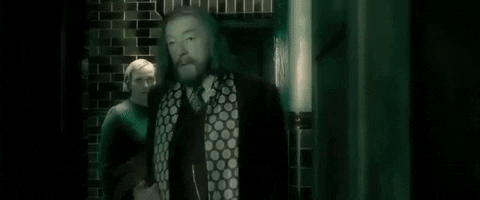
I'm going to be super biased, because my favorite portrayal of Tom Riddle is actually Hero Fiennes-Tiffin as eleven-year-old Tom Riddle, in HBP and I get to chat about child psych in this one, sooo here we go.
First of all, I’m just so impressed that a kid could bring that much depth to such a complex character.
This is the portrayal, I feel, that brings us closest to Tom’s character. Yes, Coulson’s brought us pretty close, but by fifth year, the mask was on.
We don't really get to see Tom looking afraid very often, but it's fear that rules his life, so it's really poignant in our first (chronologically) introduction, he looks absolutely terrified.
The void being the fandom's loud opinions on a certain headmaster. I wouldn't call myself pro-Dumbledore, but I'm certainly not anti-Dumbledore, either. (Agnostic-Dumbledore??)
Since I'm not of the anti-Dumbledore persuasion, I decided to poke around in the tags and see what the arguments were, so I don't make comments out of ignorance.
Most of the tag seems to be more directed towards his treatment of Harry and Sirius, but a few people mentioned that Dumbledore should have treated Tom with ‘exceptional kindness’ and tried to ‘rehabilitate’ him.
As I said in Parts 2 and 3, I am 100% in favor of helping a traumatized kid learn to cope, and I don’t think Tom Riddle was solidly on the Path to Evil (TM) at birth, or even at eleven. Not even at fifteen.
Could unconditional love and kindness have helped Tom Riddle enough for the rise of Lord Voldemort to never happen? Possibly, but...
Yes, I'm about to drag up that Carl Jung quote, again.
“I am not what happened to me, I am what I choose to become.”
The problem with this is that if you’re going to blame Dumbledore for this, you also have to blame every other adult in Tom’s life: his headmaster, Dippet, his Head of House, Slughorn, his ‘caretakers’ at the orphanage, Mrs. Cole and Martha, and possibly more. In fact, if we're going to blame any adult, let's blame Merope for r*ping and abusing Tom Riddle Senior, and having a kid she wasn't intending to take care of.
Furthermore, you cannot possibly hold anyone but Tom accountable for the murders he committed. (I should not have to sit here and explain why cold-blooded murder is wrong.) And if you like Tom Riddle's character, insinuating that his actions are completely at the whim of others is just a bit condescending towards him. He's not an automaton or a marionette, he's a very intelligent human being with a functioning brain, and at sixteen is fully capable of moral reasoning and critical analysis.
I've heard the theories about Dumbledore setting the Potters up to die, and I'm not going to discuss their validity right now; but he didn't put a wand in Tom's hand and force him to kill anyone. Tom did it all of his own accord.
And while yes, I have enormous sympathy for what happened to Tom as a child, at some point, he decided to murder Myrtle Warren, and that is where I lose my sympathy. Experiencing trauma does not give you the right to inflict harm on others. Yes, Tom was failed, but then, he spectacularly failed himself.
We also have no idea how Dumbledore treated Tom as a student.
In the movies, it’s Dumbledore who tells Tom he has to go back to the orphanage, but in the books, it’s Dippet. We know that Slughorn spent a lot of time around Tom at Slug Club and such, yet I don’t really see people clamoring for his head.
I regard the sentiment that Dumbledore turned Tom Riddle into Lord Voldemort with a lot of skepticism.
But let's hear from the character himself -- his impression of eleven-year-old Tom Riddle.

“Did I know that I had just met the most dangerous Dark wizard of all time?” said Dumbledore. “No, I had no idea that he was to grow up to be what he is. However, I was certainly intrigued by him. I returned to Hogwarts intending to keep an eye upon him, something I should have done in any case, given that he was alone and friendless, but which, already, I felt I ought to do for others’ sake as much as his."
Now, assuming that Dumbledore's telling the truth, I'm not seeing something glaringly wrong with this. No, he hasn't pigeonholed Tom as evil, yes, I'd be intrigued, too, and it's a very good idea to keep an eye on Tom, for his own sake.
“At Hogwarts,” Dumbledore went on, “we teach you not only to use magic, but to control it. You have — inadvertently, I am sure — been using your powers in a way that is neither taught nor tolerated at our school."
Again, it seems like he's at least somewhat sympathetic towards Tom, and is willing to at least give him a chance.
More evidence (again, assuming Dumbledore is a reliable narrator):
Harry: “Didn’t you tell them [the other professors], sir, what he’d been like when you met him at the orphanage?”
Dumbledore: “No, I did not. Though he had shown no hint of remorse, it was possible that he felt sorry for how he had behaved before and was resolved to turn over a fresh leaf. I chose to give him that chance.”
Now, I think Dumbledore is pretty awful with kids, but I don't think that's malicious. Yeah, it's a flaw, but perfect people don't exist, and perfect characters are dead boring. I am not saying that he definitely handled Tom's case well, I'm just saying that there's little evidence that Dumbledore, however shaken and scandalized, wrote him off as 'evil snake boy.'
It's also worth taking into account that it's 1938, and the attitudes towards mental health back then.
Why is Tom looking at Dumbledore like that, anyway? Why is he so scared? What has he possibly been threatened with or heard whispers of?
"'Professor'?" repeated Riddle. He looked wary. "Is that like 'doctor'? What are you here for? Did she get you in to have a look at me?"
"I don't believe you," said Riddle. "She wants me looked at, doesn't she? Tell the truth!"
"You can't kid me! The asylum, that's where you're from, isn't it? 'Professor,' yes, of course -- well, I'm not going, see? That old cat's the one who should be in the asylum. I never did anything to little Amy Benson or Dennis Bishop, and you can ask them, they'll tell you!
Tom keeps insisting he's not mad until Dumbledore finally manages to calm him down.
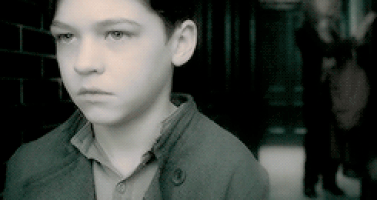
I'm really upset this wasn't in the movie, because it's important context. Instead we got these throwaway cutscenes of some knick-knacks relating to the Cave he's got lying around, but I just would have preferred to see him freaking out like he does in the book.
There was extreme stigma and prejudice towards mental illness.
'Lunatic asylums,' as they were called in Tom's time, were terrible places. In the 1930s and 40s, he could look forward to being 'treated' with induced convulsions, via metrazol, insulin, electroshock, and malaria injections. And if he stuck around long enough, he could even look forward to a lobotomy!
So, if you think Dumbledore was judgmental towards Tom, imagine how flat-out prejudiced whatever doctors or 'experts' Mrs. Cole might have gotten in to 'look at him' must have been!
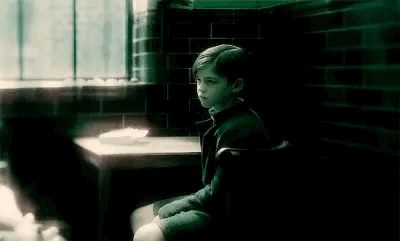
Moving on to the next few shots, he is sitting down and hunched over as if expecting punishment or at least some kind of bad news, Dumbledore is mostly out of the frame. He’s trapped visually, by Dumbledore on one side, and a wall on the other, because he’s still very much afraid. uncomfortable, as he tells Dumbledore a secret that he fears could get him committed to an asylum (which were fucking horrible places, as I said).
It brings to the scene that miserable sense of isolation and loneliness to that has defined Tom’s entire life up to that point (and, partially due to his own bad choices, continues to define it).
And, when Dumbledore accepts it, his posture changes. he becomes more confident and more at ease, as he describes the... utilities of his magical abilities.
"All sorts," breathed Riddle. A flush of excitement was rising up his neck into his hollow cheeks; he looked fevered. "I can make things move without touching them. I can make animals do what I want them to do, without training them. I can make bad things happen to people who annoy me. I can make them hurt if I want to."
Riddle lifted his head. His face was transfigured: There was a wild happiness upon it, yet for some reason it did not make him better looking; on the contrary, his finely carved features seemed somehow rougher, his expression almost bestial.
I do think Harry, our narrator, is being a tad bit judgmental here. Magic is probably the only thing that brings Tom happiness in his grey, lonely world, and when I was Tom's age and being bullied, if I had magic powers, you'd better believe that I'd (a) be bloody ecstatic about it (b) use them. And, like Tom, I can't honestly say that I can't imagine getting a bit carried-away with it. Unfortunately, we can't all be as inherently good and kindhearted as Harry.
Reading HBP again, as a 'mature' person, it almost seems like the reader is being prompted to see Tom as evil just because he's got 'weird' facial expressions.
So... uh...
Nope, let's judge Tom on his actions, not looks of 'wild happiness.'
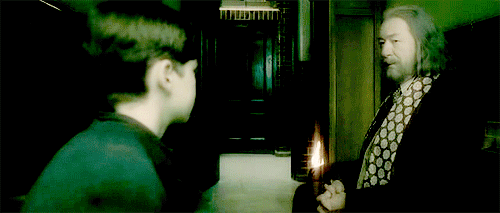
To his great surprise, however, Dumbledore drew his wand from an inside pocket of his suit jacket, pointed it at the shabby wardrobe in the corner, and gave the wand a casual flick.
The wardrobe burst into flames.
Riddle jumped to his feet; Harry could hardly blame him for howling in shock and rage; all his worldly possessions must be in there. But even as Riddle rounded on Dumbledore, the flames vanished, leaving the wardrobe completely undamaged.
Okay, one thing I dislike is Tom's lack of emotional affect when Dumbledore burned the wardrobe, in the books, he jumped up and started screaming, instead of looking passively (in shock, perhaps?) at the fire. Incidentally, I can't really tell if he's impressed or in shock, to be honest. I think they really tried to make Tom 'creepier' in the movie.
This is one of the incidents where Dumbledore's inability to deal with children crops up.
I think he was trying to teach Tom that magic can be dangerous, and he wouldn't like it to be used against him, but burning the wardrobe that contains everything he owns was a terrible move on Dumbledore's part. Tom already has very limited trust in other people, and now, he's not going to trust Dumbledore at all -- now, he's put Tom on the defensive/offensive for the rest of their interaction, and perhaps for the rest of their teacher-student relationship.
Riddle stared from the wardrobe to Dumbledore; then, his expression greedy, he pointed at the wand. "Where can I get one of them?"
"Where do you buy spellbooks?" interrupted Riddle, who had taken the heavy money bag without thanking Dumbledore, and was now examining a fat gold Galleon.
But I'm not surprised Tom is 'greedy.' He's grown up in an environment where if he wants something, whether that's affection, food, money, toys, he's got to take it. There's no one looking after his needs specifically. I'm not surprised that he's a thief and a hoarder, and I don't think that counts as a moral failing necessarily, and more of a maladaptive way of seeking comfort. It would be bizarre if he came out of Wool's Orphanage a complete saint.
Additionally, I think given that the Gaunt family has a history of 'mental instability,' Tom is a sensitive child, and the trauma of growing up institutionalized and possibly being treated badly due to his magical abilities or personality disorder deeply affected him.
And there are points where it seems that Dumbledore is quick to judge Tom.
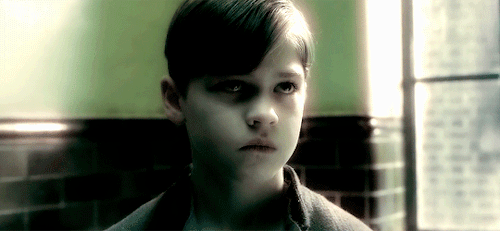
"He was already using magic against other people, to frighten, to punish, to control."
"Yes, indeed; a rare ability, and one supposedly connected with the Dark Arts, although as we know, there are Parselmouths among the great and the good too. In fact, his ability to speak to serpents did not make me nearly as uneasy as his obvious instincts for cruelty, secrecy, and domination."
"I trust that you also noticed that Tom Riddle was already highly self-sufficient, secretive, and, apparently, friendless?..."
And while this is all empirically true, these are (a) a product of Tom's harsh environment, and (b) do not necessarily make him evil. But the point remains that child psych didn't exist as a field of its own, and psychology as a proper science was in its infancy, so I'd be shocked if Dumbledore was insightful about Tom's situation.
But I've gone a ton of paragraphs without citing anything, so I've got to rectify that.
Let's talk about Harry Harlow's monkey experiments in the 1950-70s.
If you're not a fan of animal research, since I know some people are uncomfortable with it, feel free to scroll past.
Here's the TL;DR: Children need to be hugged and shown affection too, not just fed and clothed, please don't leave babies to 'cry out' and ignore their needs because it's backwards and fucking inhumane. HUG AND COMFORT AND CODDLE CHILDREN AND SPOIL THEM WITH AFFECTION!
I will put more red writing when the section is over.
This is still an interesting experiment to have in mind while we explore the whole 'no one taught Tom Riddle how to love' thing and whether or not it's actually a good argument.
Andddd let's go all the way back to the initial 1958 experiment, featured in Harlow's paper, the Nature of Love. (If you're familiar with Maslow's Hierarchy of Needs, him and Harlow actually collaborated for a time).
To give you an idea of our starting point, until Harlow's experiment, which happened twenty years after Dumbledore meets Tom for the first time, no one in science had really been interested in studying love and affection.
"Psychologists, at least psychologists who write textbooks, not only show no interest in the origin and development of love or affection, but they seem to be unaware of its very existence."
I'm going to link some videos of Harry Harlow showing the actual experiment, which animal rights activists would probably consider 'horrifying.' It's nothing gory or anything, but if you are particularly soft-hearted (and I do not mean that as an insult), be warned. It's mostly just baby monkeys being very upset and Harlow discussing it in a callous manner. Yes, today it would be considered unethical, but it's still incredibly important work and if you think you can handle it, I would recommend watching at least the first one to get an idea of how dramatic this effect is.
Dependency when frightened
The full experiment
The TL;DW:
This experiment was conducted with rhesus macaques; they're still used in psychology/neuroscience research when you want very human-like subjects, because they are very intelligent (unnervingly so, actually). I'd say that adult ones remind me of a three-year old child.
Harlow separated newborn monkeys from their mothers, and cared for their physical needs. They had ample nutrition, bedding, warmth, et cetera. However, the researchers noticed that the monkeys:
(a) were absolutely miserable. And not just that, but although all their physical needs were taken care of, they weren't surviving well past the first few days of life. (This has also been documented in human babies, and it's called failure to thrive and I'll talk about it a bit later).
(b) showed a strong attachment to the gauze pads used to cover the floor, and decided to investigate.
So, they decided to provide a surrogate 'mother.' Two, actually. Mother #1 was basically a heated fuzzy doll that was nice for the monkeys to cuddle with. Mother #2 was the same, but not fuzzy and made of wire. Both provided milk. The result? The monkeys spent all their time cuddling and feeding from the fuzzy 'mother.' Perhaps not surprising.
What Harlow decided next, is that one of the hallmarks being attached to your caregiver is seeking hugs and reassurance from them when frightened. So, when the monkeys were presented with something scary, they'd go straight to the cloth mother and ignore the wire one. Not only that, but when placed in an unfamiliar environment, if the cloth mother was present, the monkeys would be much calmer.
In a follow-up experiment, Harlow decided to see if there was some sort of sensitive period by introducing both 'mothers' to monkeys who had been raised in isolation for 250 days. Guess what?
The initial reaction of the monkeys to the alterations was one of extreme disturbance. All the infants screamed violently and made repeated attempts to escape the cage whenever the door was opened. They kept a maximum distance from the mother surrogates and exhibited a considerable amount of rocking and crouching behavior, indicative of emotionality.
Yikes. So, at first Harlow thought that they'd passed some kind of sensitive period for socialization. But after a day or two they calmed down and started chilling out with the cloth mother like the other monkeys did. But here's a weird thing:
That the control monkeys develop affection or love for the cloth mother when she is introduced into the cage at 250 days of age cannot be questioned. There is every reason to believe, however, that this interval of delay depresses the intensity of the affectional response below that of the infant monkeys that were surrogate-mothered from birth onward
All these things... attachment, affection, love, seeking comfort ... are mostly learned behaviours.
Over.
Orphanages, institutionalized childcare, and why affection is a need, not an extra.
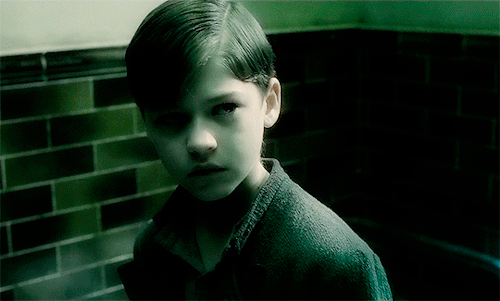
His face is lit the exact same was as Coulson’s was in COS (half-light, half-dark), and I said I was going to talk about this in Part 3. I think perhaps it's intended to make Fiennes-Tiffin look more evil or menacing, but I'm going to quite deliberately misinterpret it.
Now, for some context, Dumbledore has just (kind of) burned his wardrobe, ratted out his stealing habit, and (in the books only, they really took a pair of scissors to this scene) told him he needs to go apologize and return everything and Dumbledore will know if he doesn't, and, well, Tom's not exactly a happy bugger about it.
But interestingly, in the books, this is when we start to see Tom's 'persona,' aka his mask, start to come into play. Whereas before, he was screaming, howling, and generally freaking out, here, he starts to hide his emotions -- in essence, obscure his true self under a shadow. So this scene is really the reverse of Coulson's in COS.
And perhaps I'm reading wayyy too much into this, but I can't help but notice that Coulson's hair is parted opposite to Fiennes-Tiffin's, and the opposite sides of their faces are shadowed, too.
Riddle threw Dumbledore a long, clear, calculating look. "Yes, I suppose so, sir," he said finally, in an expressionless voice.
Riddle did not look remotely abashed; he was still staring coldly and appraisingly at Dumbledore. At last he said in a colorless voice, "Yes, sir."
Here's an article from The Atlantic on Romanian orphanages in the 1980s, when the dictator, Ceausescu, basically forced people to have as many children as possible and funnel them into institutionalized 'childcare', and it's absolutely heartbreaking.
There's not a whole lot of information out there on British orphanages in the 30s' and 40s', but given that people back then thought you just had to keep children on a strict schedule and feed them, it wouldn't have a whole lot better.
The only thing I've found is this, and it's not super promising.
The most important study informing the criteria for contemporary nosologies, was a study by Barbara Tizard and her colleagues of young children being raised in residential nurseries in London (Tizard, 1977). These nurseries had lower child to caregiver ratios than many previous studies of institutionalized children. Also, the children were raised in mixed aged groups and had adequate books and toys available. Nevertheless, caregivers were explicitly discouraged from forming attachments to the children in their care.
Here's a fairly recent paper that I think gives a good summary: Link
Here, they describe the responses to the Strange Situation test (which tests a child's attachment to their caregiver).
We found that 100% of the community sample received a score of “5,” indicating fully formed attachments, whereas only 3% of the infants living in institutions demonstrated fully formed attachments. The remaining 97% showed absent, incomplete, or odd and abnormal attachment behaviors.
Bowlby and Ainsworth, who did the initial study, thought that children would always attach to their caregivers, regardless of neglect or abuse. But some infants don't attach (discussed along with RAD in Part 2).
Here's a really good review paper on attachment disorders in currently or formerly institutionalized children : Link
Core features of RAD in young children include the absence of focused attachment behaviors directed towards a preferred caregiver, failure to seek and respond to comforting when distressed, reduced social and emotional reciprocity, and disturbances of emotion regulation, including reduced positive affect and unexplained fearfulness or irritability.
Which all sounds a lot like Tom in this scene. The paper also discusses neurological effects, like atypical EEG power distribution (aka brain waves), which can correlate with 'indiscriminate' behavior and poor inhibitory control; which makes sense for a kid who, oh, I don't know, hung another kid's rabbit because they were angry.
Furthermore...
...those children with more prolonged institutional rearing showed reduced amygdala discrimination and more indiscriminate behavior.
This again, makes a ton of sense for Tom's psychological profile, because the amygdala (which is part of the limbic system, which regulates emotions) plays a major role in fear, anger, anxiety, and aggression, especially with respect to learning, motivation and memory.
So, I agree completely that Tom needed a lot of help, especially given the fact that he spent eleven years in an orphanage (longer than the Bucharest study I was referring to), and Dumbledore wasn't exactly understanding of his situation, and probably didn't realise what a dramatic effect the orphanage had on Tom, and given the way he talks to Tom, probably treated him as if he were a kid who grew up in a healthy environment.
In case you are still unconvinced that hugging is that important, there's a famous 1944 study conducted on 40 newborn human infants to see what would happen if their physical needs (fed, bathed, diapers changed) were provided for with no affection. The study had to be stopped because half the babies died after four months. Affection leads to the production of hormones and boosts the immune system, which increases survival, and that is why we hug children and babies should not be in orphanages. They are supposed to be hugged, all the time. I can't find the citation right now, I'll add it later if I find it.
But I think it's vastly unrealistic to say that Dumbledore, who grew up during the Victorian Era, would have any grasp of this and I don't think he was actively malicious towards Tom.
Was Tom Riddle failed by institutional childcare? Absolutely.
Were the adults in his life oblivious to his situation? Probably.
Do the shitty things that happened to Tom excuse the murders he committed, and are they anyone's fault but his own? No. At the end of the day, Tom made all the wrong choices.
And, for what it's worth, I think (film) Dumbledore (although he expresses the same sentiment in more words in the books) wishes he could go back in time and have helped Tom.
"Draco. Years ago, I knew a boy, who made all the wrong choices. Please, let me help you."
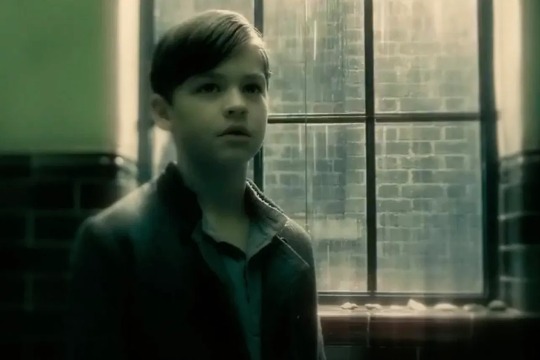
#tom riddle#the many faces of#tom marvolo riddle#character analysis#character study#albus dumbledore
144 notes
·
View notes
Text
Christian normativity and Lovecraft Country
Reposted from my personal blog.
Here’s something you need to wrap your head around. If you were brought up in an environment dominated by Christian culture, Christian norms have shaped the way you conceptualize how the world works, human nature, ethics, religion (even the term religion is Christian-normative), and so on.
It doesn’t matter if you actively practice or believe. IMO, unless you deliberately and consistently expose yourself to different frameworks, you are generally operating from a Christian lens. That’s just how socialization works.
In the case of media and media criticism, the Christian framework shows up in a deeply puritanical streak where good and evil are not actions and choices, but states of being. When a character does something beneficial, it’s because they are good. If they do something harmful, it’s because they are bad.
It also shows up in the ways that fandom discourse seems preoccupied with whether a character’s thoughts, feelings, or actions are morally justified or not, as opposed to understanding where those thoughts, feelings, and actions come from.
Consider Montrose. He does some horrible stuff in this show, and many viewers were upset by the way the narrative went out of its way to explore where those horrific actions come from rather than condemn him for them. Meanwhile, I’m sitting here thinking, “Of course he does that, considering what his experiences have taught him.” But at the time the show was airing, if I’d expressed that openly, I’d have gotten a lot of, “Why are you trying to justify all the bad things Montrose has done?”
*smh*
In Lovecraft Country, the Christian normativity also shows up in the way it tries to shoehorn the plot (especially the finale) into a typical Good vs. Evil (or God vs. Satan—more on this in a bit) narrative even though the characters themselves are too complex for that. Then the show Goes There with the hamfisted way it links Tic with Jesus, all the way down to his martyred blood being the source of salvation, and Christina with Satan or the Antichrist, a morally corrupt enemy of goodness/God who tempts humans to embrace forbidden knowledge (magic) and forbidden pleasures (non-cishet sex).
(IMO, the show did Christina a disservice by making her the ultimate villain because she’s a lot more fun as a wild card. Also, her character is more akin to the tricksters of myth and folklore than the villains of contemporary media. /tangent)
Then there’s the way that, in the US, the legacy of slavery, and later Jim Crow, is seen as a kind of Original Sin, which the show reinforces rather than challenges. In very simplistic terms, Original Sin means that you are automatically morally corrupt from birth, and nothing you do can undo that except faith in Jesus. In other words, you are born bad and condemned to damnation unless you think, feel, and believe the right thing.
This insinuation of Original Sin is most pronounced with how the narrative frames Christina and how viewers respond to her. I’ve seen a lot of people judge her for having the “wrong” thoughts, feelings, beliefs, and attitudes, using that as an argument against her capacity to change and grow. Even the ways she helps and empowers others become automatically suspect because of this “taint.”
*siiiiigh*
Y’all, you have to understand how weird this looks to my Jewish self.
Imagine this rich heiress who kills a bunch of Nazis. She does it for her own reasons that aren’t the least bit altruistic. That’s still fewer Nazis for me to worry about. We can argue about her motives when there are no more Nazis. But for now: Thanks, lady!
But the way some viewers would have it, I’m supposed to be like…
Me: “I know you killed all these Nazis, but do you really care about my people?”
Her: “No.”
Me: “You horrible person! If you don’t care, don’t bother killing any Nazis at all!”
Haha. OK. Sure, Jan.
I’m not gonna go down the rabbit hole of Jewish ethics and moral development, but to summarize Jewish ethics while standing on one foot, the important thing is the Do The Thing. Even though it’s ideal to Do The Thing for the right reasons, whatever it takes to get you to Do The Thing is valid (some conditions about Doing The Other Things apply). Good intentions don’t absolve people of wrongdoing, nor do ulterior motives erase the good that people do.
Furthermore, sin is not a state of being in Jewish tradition. It’s an action or behavior akin to an arrow missing its target. Our job is to fix what we can and try again, failing better until we hit our target.
So Christina crashing her car into truckload of racists matters. Giving Leti enough money to pay for a house matters. Sharing magical secrets with Tic and Ruby matters. Keeping her promise not to harm Leti matters.
Now, if I really wanna get Jewish about this, I’d argue that Christina’s deep yearning for human connection, for family and for love, is what can give her the drive to learn better* and do better. This may strike some with deeply ingrained Christian norms as selfish, or at the very least, self-interested. However, Jewish tradition encourages us to perform mitzvot and other good deeds using both our yetzer hatov (our “good” impulse—think the Freudian** superego) and our yetzer hara (our “evil” impulse—think the Freudian id). Our job is not to suppress or deny the part that wants things for ourselves, but to refine it and channel it toward constructive purposes.
I think that’s about it.
Happy Hanukkah!
*Moral development through learning and study is a hallmark of Jewish ethics. No one is born knowing right from wrong. It has to be taught and cultivated.
**Freud was Jewish, BTW.
64 notes
·
View notes
Text
In which I talk about the Christian normativity that infuses Lovecraft Country
Reposted and edited from Twitter.
Here’s something you need to wrap your head around. If you were brought up in an environment dominated by Christian culture, Christian norms have shaped the way you conceptualize how the world works, human nature, ethic, religion (even the term religion is Christian-normative), and so on.
It doesn’t matter if you actively practice or believe. IMO, unless you deliberately and consistently expose yourself to different frameworks, you are generally operating from a Christian lens. That’s just how socialization works.
In the case of media and media criticism, the Christian framework shows up in a deeply puritanical streak where good and evil are not actions and choices, but states of being. When a character does something beneficial, it’s because they are good. If they do something harmful, it’s because they are bad.
It also shows up in the ways that fandom discourse seems preoccupied with whether a character’s thoughts, feelings, or actions are morally justified or not, as opposed to understanding where those thoughts, feelings, and actions come from.
Consider Montrose. He does some horrible stuff in this show, and many viewers were upset by the way the narrative went out of its way to explore where those horrific actions come from rather than condemn him for them. Meanwhile, I’m sitting here thinking, “Of course he does that, considering what his experiences have taught him.” But at the time the show was airing, if I’d expressed that openly, I’d have gotten a lot of, “Why are you trying to justify all the bad things Montrose has done?”
*smh*
In Lovecraft Country, the Christian normativity also shows up in the way it tries to shoehorn the plot (especially the finale) into a typical Good vs. Evil (or God vs. Satan—more on this in a bit) narrative even though the characters themselves are too complex for that. Then the show Goes There with the hamfisted way it links Tic with Jesus, all the way down to his martyred blood being the source of salvation, and Christina with Satan or the Antichrist, a morally corrupt enemy of goodness/God who tempts humans to embrace forbidden knowledge (magic) and forbidden pleasures (non-cishet sex).
(IMO, the show did Christina a disservice by making her the ultimate villain because she's a lot more fun as a wild card. Also, her character is more akin to the tricksters of myth and folklore than the villains of contemporary media. /tangent)
Then there's the way that, in the US, the legacy of slavery, and later Jim Crow, is seen as a kind of Original Sin, which the show reinforces rather than challenges. In very simplistic terms, Original Sin means that you are automatically morally corrupt from birth, and nothing you do can undo that except faith in Jesus. In other words, you are born bad and condemned to damnation unless you think, feel, and believe the right thing.
This insinuation of Original Sin is most pronounced with how the narrative frames Christina and how viewers respond to her. I’ve seen a lot of people judge her for having the “wrong” thoughts, feelings, beliefs, and attitudes, using that as an argument against her capacity to change and grow. Even the ways she helps and empowers others become automatically suspect because of this “taint.”
*siiiiigh*
Y’all, you have to understand how weird this looks to my Jewish self.
Imagine this rich heiress who kills a bunch of Nazis. She does it for her own reasons that aren't the least bit altruistic. That's still fewer Nazis for me to worry about. We can argue about her motives when there are no more Nazis. But for now: Thanks, lady!
But the way some viewers would have it, I'm supposed to be like...
Me: "I know you killed all these Nazis, but do you really care about my people?"
Her: "No."
Me: "You horrible person! If you don’t care, don’t bother killing any Nazis at all!"
Haha. OK. Sure, Jan.
I’m not gonna go down the rabbit hole of Jewish ethics and moral development, but to summarize Jewish ethics while standing on one foot, the important thing is the Do The Thing. Even though it's ideal to Do The Thing for the right reasons, whatever it takes to get you to Do The Thing is valid (some conditions about Doing The Other Things apply). Good intentions don’t absolve people of wrongdoing, nor do ulterior motives erase the good that people do.
Furthermore, sin is not a state of being in Jewish tradition. It’s an action or behavior akin to an arrow missing its target. Our job is to fix what we can and try again, failing better until we hit our target.
So Christina crashing her car into truckload of racists matters. Giving Leti enough money to pay for a house matters. Sharing magical secrets with Tic and Ruby matters. Keeping her promise not to harm Leti matters.
Now, if I really wanna get Jewish about this, I'd argue that Christina's deep yearning for human connection, for family and for love, is what can give her the drive to learn better* and do better. This may strike some with deeply ingrained Christian norms as selfish, or at the very least, self-interested. However, Jewish tradition encourages us to perform mitzvot and other good deeds using both our yetzer hatov (our “good” impulse—think the Freudian** superego) and our yetzer hara (our “evil” impulse—think the Freudian id). Our job is not to suppress or deny the part that wants things for ourselves, but to refine it and channel it toward constructive purposes.
I think that’s about it.
Happy Hanukkah!
*Moral development through learning and study is a hallmark of Jewish ethics. No one is born knowing right from wrong. It has to be taught and cultivated.
**Freud was Jewish, BTW.
#lovecraft country meta#fandom meta#cultural christianity#christina braithwhite#jumblr#because it's hanukkah#or chanukkah#pookie is jewish
29 notes
·
View notes
Text
thoughts on my own relationship to fanfic writing, b/c there was some talk about it on the tl (plus many many posts in recent weeks/months):
i went through a period a few years ago when i was trying to convince myself that what was necessary to pursue my original writing “seriously” was to quit fandom and stop writing fic, etc etc, because i was conceptualizing it like a sinkhole for my attention or writing energy. taking that step back was useful for me in some senses, mostly in terms of gaining perspective wrt stupid and stressful fandom infighting and making me reassess what i actually wanted to get out of being involved in online fan communities, but it was quite lonely--for better or for worse, i grew up a terminally online rural queer teenager in an evangelical christian mileu, and online fan culture was really formative to the person i grew into as an adult. it’s a type of social interaction that isn’t easily replaceable, even as i have a very different irl environment now.
so, in practice, what “backing off of fandom in the name of my Art” led to was a fallow period in my writing life. think i was so fixated on the dichotomy between my fic writing as something inherently silly that i needed to grow out of and that had no bearing on the “real” writing i wanted to make, which was going to Say Something About The World, that it became really hard to actually do that “real” writing because it felt joyless and bogged down in expectation vis a vis quality and Seriousness. what ended up getting me back into writing after a year or so of not producing much of anything worth talking about was rediscovering a sense of joy about writing through getting back into fanfic, because it was something that i could do as part of a community that felt playful--i wasn’t overthinking things to death or berating myself for how my work was out of step with what publishers want to see, etc, because it was irrelevant. the only point was to make something for myself--which you can do with original writing, of course, but i needed that encouragement and sense of group interest that comes from sharing work to a limited-but-enthusiastic ready-made audience, which is one of the things fanfic has going for it.
it’s been a few years since then and my relationship to writing in general has changed A Lot, but losing my sense of shame about fic writing being a hobby that i enjoy for its own sake did a lot of good for my relationship to my writing in general. taking on self-indulgent projects that exist outside of publishing marketability has done a lot for helping me get a sense of what kinds of narratives and unexplored corners of existing works i’m drawn to, in a way that i can then take and apply to my original writing. that could definitely have happened even if i never came back to writing fic, but i think would’ve been slower. i’ve stopped writing original work with the mentality of trying to appeal to a nonexistent subset of the publishing market, and instead been following desire lines to figure out what i, personally, want to be reading that doesn’t yet exist, rather than trying to figure out how to pivot my own personal history into thinly-veiled autobiographical queer memoir that could get some minor success as a cancon title or whatever. is writing novels without consideration for what editors want to see in slushpiles a good decision? probably not, but i’m actually, like, writing them now instead of just feeling guilty for not writing them, which is better than nothing. and i do find writing fanfic really fun and joyful, and cultivating a joyful approach to fic writing--as something done purely for pleasure with no expectation of material gain or name recognition etc--really helped me figure out how to translate that mentality to my original work.
so anyway. corny careerist acafans who claim that fanfic is inherently radical and artistically valuable are embarrassing, but i’ve also stopped giving a shit about the opinions of people who think it’s cringe to write fanfic as a 25 year old or whatever, largely because it’s truly just a hobby i do for fun and i don’t think i owe anyone an apology for that. that being said, i think it does enrich my relationship to my original work, which it should be noted is also just a hobby, as i have no desire to be a writer full-time (though i would like to pursue publication at some point.) at the same time, i can’t subsist on a diet of fic alone--i’ve read a lot of fic in my time that’s stuck with me and impacted me artistically/emotionally, but i have a hard time maintaining my interest in writing in general unless i’m consuming other types of fiction and poetry as much if not more than i am ~transformative work~, and i always experience the cringe emotion when people who feel insecure about their writing/reading patterns respond to that feeling with wild takes about the lack of value of genres of published fiction they patently don’t read. kids can we lighten up a little...
tl;dr i think writing stuff for fun in the context of an online fan community can be an end goal itself if you are indeed having fun with it and there isn’t anything inherently embarrassing about it; personally speaking my orig work and fic work have interacted in generative ways but are also just different activities that serve different purposes for me; the two positions of “fanfic is actually the most amazing real and true form of art because it’s METATEXTUAL and QUEER and POPULIST etc etc unlike stupid ‘BOOKS’” and “no one has ever written fanfic for any reason than to jack off about cartoon characters” are both dumb asf and it really is not that serious
that being said i do also just like to read and write weird p*rn in an environment where writing and consuming weird gay p*rn is socially normalized. i’m only HUMAN
6 notes
·
View notes
Text

[ HANDE ERCEL, CIS FEMALE, SHE / HER ] shh ! JOSEPHINE AYDIN, the TWENTY ONE year old SECOND year GRAPHIC DESIGN & CREATIVE WRITING major from EDINBURGH, SCOTLAND, is known as an AMBER around here. SHE was invited to join because SHE UNEARTHED STRATHMORE'S BEST KEPT SECRET, and now, they’re here to stay. SHE reminds me of HOT CUPS OF COFFEE CRADLED IN SWEATER - CLAD HANDS, KNOWING GAZE CAST OVER THE PAGES OF A WELL - VERSED NOVEL, & RIBBONS TYING BACK SEA OF DARK CURLS.
hello friends 🥺👉👈 i’m andie ( she / her, twenty one, est, no stable sleep schedule ) & i’m here to bring my precious babie, the second - year amber, josephine aydin ! i’ve included a link to her google docs ( which is extra as all hell, please don’t @ me ) which has most of the information i have on her, but for everyone’s sake, i’ll include some tl;dr bullet points here !
biography .
josephine’s google doc includes a stat breakdown, how she’s perceived by a number of people, her aesthetics, a more or less biography ( which apparently i’ve basically detailed below i am too long winded for my own good ), and a handful of wanted connections ! i’ll have it up on a page on her blog soon !
the basics .
third youngest of the aydin children, josephine was constantly overlooked in favor of her established prodigy siblings; a brother who inherited mother’s natural skill for music and a sister who, while not musically inclined, took after her mother’s obvious drive for ambition. perhaps she’d be a doctor like her father, top of her class and a prime candidate at any prestigious medical school, or an actress, for she already commanded the stage well. but josephine showed no interest in any of those things, so unlike her family that most forgot she bore the aydin name.
a youth best spent in shadows, at siblings every performance and undoubtedly their number one fan. she didn’t blame them for her parents disinterest in her, and for what it’s worth, they were always the ones most willing to get her to step out of comfort zone. to try new hobbies and activities her parents had discarded for her. she was still young, but her siblings offered her an unwavering support just as she did them.
a wild imagination and an eye for finer details lead her to be a publish writer, even if it’s in just the smallest sections of the school newspaper or your english teacher’s bulletin board. an avid member of the writing club, the school book club, and a visitor to most art classes, she took more joy in what is hidden within books and on paper than how she appeared to others. she took great pride in her work, of course, but she almost never called attention to herself; growing up sheltered from the critical eyes of others will do that to you.
( death mention tw ) short stories that detail her siblings as knights and fair maidens and her parents as the evil that plagues the kingdom, it’s no wonder her parents were never privy to her interest. but for every story detailing them as her savior, she could only wish to be theirs when news of their death reaches her. both killed under mysterious circumstances in their childhood home while parents were away and she was on a school trip, she bears their death as though she’s at fault. as if she could have done anything to save them, and she would’ve done it all, if she could.
the end of her secondary school career is plagued by their loss, one that weighs heavily on her shoulders and heart. parents who can’t bear to look at her as a reminder of what they’ve lost, who push her so far away that her only solace is strathmore, an entire country away. they do not bid her farewell and she does not seek their approval when it comes time to decide her future’s path. a double major in creative writing and graphic design, a knack for creativity finally unlocked.
no longer the other aydin, she created herself as josephine within strathmore’s walls, her own dreams and ambitions and no more crushing weight of parent’s expectations. but it is a dangerous line she walks, always too curious, too used to being a fly on the wall, for her own good and innocent research into any number of topics - history of the school you now call home, of words she heard whispered like a ghost in the wind. as if they hadn’t been real at all. it’s in the midst of researching for a story when she stumbles across something more concrete, the same latin words whispered now doting some of the oldest books the library held.
it’s a rabbit hole she can’t pull herself from, free time spent learning about a society so secret that it’s mere existence seemed like a myth. she doesn’t put much stock in it, of course, surely it had slipped away like most clubs do over time, until the mysterious individual stood waiting outside her dorm at the start of the year, equally as questionable invitation in hand. symbols and latin both equally recognized, instinct tells her that she’s dug too deep and they’re ready to keep her quiet. but it’s not near as malicious as over - active imagination declares and she finds herself at a small advantage. but how advantageous was it to know of secrets that were kept that way for a reason ?
the opal society is sketchy in the way she imagined most things of this nature to be, right up there with questionable greek life activities behind closed doors, but there is excitement that buds eagerly in her chest. a chance to be a part of something bigger than herself, to know she was picked out of thousands to uphold a legacy that stands for more than what most would think. she'd made friends easily enough before this, but now she has friends that she shares something special with, an experience as trying as it was bonding, and she couldn't be more excited for what was to come.
more aesthetics .
glossy lips tinted strawberry red curled into ghost of a smile, cheeks kissed by the winter wind, the habitual tugging of a loose thread from worn sweaters and pressed button - downs, elegant script turned messy scrawl in a flurry of last minute notes, the pastel color coordination of detailed notes; so well kept that it’s impossible not to follow, polaroid photos strung above dorm room bed; memories always kept so close to heart, cracked spines of leather bound books read too many times, the feeling of cool metal jewelry pressed flush against skin; dainty silver professing an obvious delicacy.
wanted connections .
the fellow creator. someone with a craft all of their own, be it a shared interest in the literary arts, a visual artist, or musical prodigy. perhaps they share it as an interest, or is something they've both managed to excel at.
the unlikely friend. someone she never would have crossed paths with outside of the opal society, who she would never have befriended otherwise. not because they differ so greatly that a friendship was impossible, but because they never would interacted on campus.
the rival. perhaps it is a rivalry that stems from knee - jerk dislike, or someone that rubbed her the wrong way or with equally notable skill in an area she considers herself just as adept. always at each other just trying to be the absolute best at whatever they do.
drinking buddies. for as quiet as she is, she’s a whole other person when loosened up by alcohol. someone she can share a few drinks with and just hang out with for hours at a time.
conspiracy theorist. i’m not saying that josie fully believes in conspiracy theories, at least not outwardly, but she definitely enjoys them conceptually and will broach them for hours with you. please don’t enable her.
this tag ( that i’m not directly linking bc aesthetic tags are the Devil ) and this tag !
anything and everything thank you please plot with me i like memes
19 notes
·
View notes
Text
WHY I LOVE ZADR!!!
HEY GUYS WHASSUP? LMAO
So this is a whole ass giant long post of me absolutely spewing my feelings of love for ZADR, it was the very first thing I wrote when I made this blog and I think it’s a nice, positive thing for my fellow shippers to inhale and enjoy 👌👌
it was originally a reply to mitarashiart’s post about why HE loves ZADR (link in replies) but I decided to delete that and make my own post since MY WHOLE ENTIRE TEXT WALL WAS SHOWN IN THE REPLIES and drowned out anyone else who was trying to talk (thanks tumblr mobile u fuckin idiot)
I had also posted a summary of an AU that I’m working on in the original post, but decided to remove it since it just about doubled the length (I’m thinking about posting it separately along with the wips I’ve been putting together, we’ll see 👀)
But ANYWAY, here is about a million reasons why I think ZADR is the fucking best, so if you like reading gushy gay ship feelings, please enjoy ❤️❤️❤️
[Posted June 2019][WARNING, LONG ASS THOUGHT BARF]
SOOO, holy hell y’all my journey back into this fandom has been a wild and unique experience for me, i went from adding invader zim to my bookmarks on kisscartoon, rewatching the series, finding out theres a movie coming out, finding out there was a shitload of content i’d never seen before (commentaries, lost episode scripts and audios, panels, the COMIC, episodes i’d never seen because the dvd i used to watch was scratched!! and a FUCKLOAD of quality modern fan art like oh my GOD) and finally curiously googling ‘zadr’ (which i was way into when i was maybeee 13/14) to see if there was any interesting new art, and holy hell, mita (the artist above) singlehandedly THREW me down the hole into modern zadr hell, first with his absolutely stunning IZ art (all his art is dope tho check him out yo), then reading the above explanation put the final nail in the coffin like, 100%
so i wanted to add onto his post here on why this ship got me so fucked up, both for anyone who might be wondering why on earth i’m shipping two characters from a kid’s show (i’m very aware how weird that is at first glance trust me) and also so i can get some ideas down for possible future reference (will i ever draw them? maybe)
(first of all, a disclaimer, and this is not pleasant to write but it’s important to address for clarity’s sake: I have no interest in romantic or sexual relationships between minors, and do not ship zim and dib as they are presented canonically in the show (as children). what i’m interested in is the conceptualized relationship they may have as modern adults, and i view zadr more as taking the concepts of existing characters and experimenting with them with different interpretations, which i personally think is a constructive and fun creative outlet, especially if these characters hold personal significance for you (childhood faves of course). growing up together is an important facet of their relationship, and certainly they were important to each other even as children (see: mopiness of doom) but as an adult i’m personally curious about what kind of adults they might’ve become, and that’s the focus of my interest. i’ll still be reblogging regular IZ art because it’s dope but if you see shippy looking art of them as tiny lil beans its either friendship or chibis (and i personally headcanon zim as getting taller with dib but some people stick with his canonical height when drawing them as adults, which is super short. it still doesn’t mean he’s a kid). aaand i wish i didnt have to write this and it would just be obvious but we live in a sick sad world and it is sourced from a children’s cartoon so i feel its necessary. end of disclaimer)
NOW THAT THAT’S OUT OF THE WAY
- ok, first reason’s a bit obvious - the nostalgia. holy hell, the feeling of rediscovering a ship that was popular when i was a preteen during the mid 2000s and discovering a totally new perspective on it as an adult comes with an almost totally overwhelming sense of nostalgia and comfort, as well as inspiration!! the kind of art that seems so common for zadr, these sketch pages of scenes and expressions and visual gags where artists would just scribble every idea they had and LOVE doing it, this was exactly the kind of art that made me so passionate about drawing as a kid, and it still sparks such a powerful feeling of love and admiration for me to this day. fan content of iz and zadr is simultaneously achingly familiar and totally new and fascinating, and it just makes me SO damn happy to consume, it is most definitely my new comfort content. and just, GOD. THE ART!! SO GOOD. FUCK
- now for the characters themselves: for some reason i just really love the thought of a mid twenties, modern Dib?? lanky goth dork, disaster bi, depressed as shit, uses bad sweaters and memes to cope?? when i was a kid i didn’t even LIKE Dib, but now i totally sympathize with him! he’s just a hyper obsessive nerd wishing there was more to life than the situation he got stuck with, how wildly relatable. he was a pretty big asshole as a kid (even to people besides zim) but he was also totally isolated and constantly bullied, so there’s a lot of room for growth. i feel there’s a lot of juicy character development potential for that boy, and there’s always been a special place in my heart for characters who are totally sad and screwed and hopeless, but there’s one thing, or person, that means the world to them and could possibly save them…
- aliens. Zim. i love nonhuman characters, i love monsters, i love aliens, i love characters that don’t understand human shit (and thus have much less room for shame or fear bc theyre just totally oblivious the negatives of modern society) and need guidance (bonding!!) from their human. i also love morally grey characters and characters with skewed logic, they’re always really interesting, and Zim himself just has such a unique personality and set of mannerisms, he contradicts himself a lot and you can never quite expect how he’ll behave, and i love that in a character, it makes them super versatile and fun, especially since there’s so many different possibilities for their development. Also, Zim is a gremlin, a little shit, and a disaster. I also love those traits in a character. And don’t even get me started on his character design?? big sparkly eyes? expressive antennae? monster teeth? complimenting colors? he’s adorable.
- mutual obsession. for someone like Dib, who seems almost repulsed by how boring and slow the people around him are, Zim quite literally personifies Dib’s escapist fantasies, both as an inhuman entity from beyond the stars, and as a person who’s knowledge, charisma and mystery far exceeds that of anyone Dib has met in his entire life. (so basically what i’m saying is that for a shunned, jaded misanthropist, an actual alien is terribly alluring, even if said alien is dangerous, stupid, and possibly insane). not to mention Zim vindicates Dib’s entire life passion, the supernatural! Even when their relationship is totally negative, there is not a single inch of room for Dib to get tired of Zim. as mita explained, they validate each other. for Zim, WHO AGAIN, IS TOTALLY SHUNNED, ISOLATED, AND HATED BY EVERYONE HE KNOWS, Dib is the only person in the universe who gives a single shit about him!! he gives Zim credit as a threat, a capable invader, which if you ask me is the sole thing Zim is after (he’s hellbent on his mission because it would win him the approval of the tallest, all he’s ever wanted is recognition from the people he thinks so highly of). He literally gets depressed when Dib isn’t around to pay attention to him, not even the tallest were enough to motivate him before Dib came back. these two have no one and nothing without each other, and while lifelong nemeses is fine and dandy, i personally prefer friendship, affection and love, cause i’m a softie like that. how could they possibly get there after years of actively trying to kill each other?? well, i think under just the right circumstances it could become a possibility after a long, long time.
- growth. i. love. me. some. good. character growth. especially for characters with trauma/mental illness, bc again, relatable. these boys have issues, and as mita mentioned, their canon stories are actually INCREDIBLY sad! but the happy thought is, they could recover! they could help each other recover, for little reason other than the two are the only source of happiness for each other. now of course this also opens the gate for angst lovers, but at the same time offers potential for comforting, uplifting content of the boys supporting and inspiring each other, maybe even to the point of becoming happy and healthy enough to create the lives they want for themselves (as in appreciating life and doing things that make them actually happy instead of the delusions of grandeur they both sought when they were younger). gimme that positive shit and let the poor beans be happy щ(ಠ益ಠщ)
- LITTLE THINGS. LITTLE THINGS THAT ONLY COME WITH CHILDHOOD FRIENDS. WITH HUMAN/NONHUMAN. WITH THE SHOW’S WEIRD LOGIC. Zim being the person Dib knows best and vice versa. Zim having an involuntary respect/admiration for Dib because he’s tall. Learning each other’s needs, limits, and communication methods, both emotionally and biologically. Sensitive antennae. Affectionate bickering. Being less insecure bc your partner literally has no idea why you see your flaws as flaws. Laughing at the flaws they do notice because they make no sense. Zim only wanting to eat waffles and chow mein. Dib being forced to overcome his depression lethargy and stay hygienic/keep the apartment clean because Zim has a sharper sense of smell and is afraid of germs. Endless conversation about anything and everything because they’re from literally different worlds, and endless intrigue. TOUCHING. TALKING. DOING EVERYTHING LIKE ITS THE VERY FIRST TIME AND ALWAYS NEEDING THE OTHER TO GUIDE THEM. HOLY HELL THERE IS SO MUCH POSSIBILITY FOR TINY LITTLE MOMENTS THAT MEAN THE WORLD. FUCK. GOT ME FUCKED UP.
so that wraps up the why. fuck man. its just such a good ship. if you read this big ass text post, thank you for indulging me, i hope you enjoyed it! because i enjoy it very much 👀 so stick around if you’d like to for a shit load of IZ and zadr content on this blog, possibly (MAYBE) even from me!! come roll around in alien hell with me why dontcha ᕕ( ᐛ )ᕗ its a fun time! thanks for reading!!!
-
SO THAT’S MY MANIFESTO Y’ALL, FEEL FREE TO REPLY WITH YOUR OWN REASONS!! I WOULD LOVE FOR THIS POST TO JUST BECOME A BIG GIANT PILE OF LOVE AND YELLING!! GO NUTS! SCREAM ABOUT IT! INFODUMP! DO WHATEVER YOU WANT! I’LL READ EVERY LAST REPLY! Y’ALL DESERVE TO ENJOY YOUR SHIP BC IT’S LITERALLY THE FUCKING BEST!!! LOVE Y’ALL!!!!!!
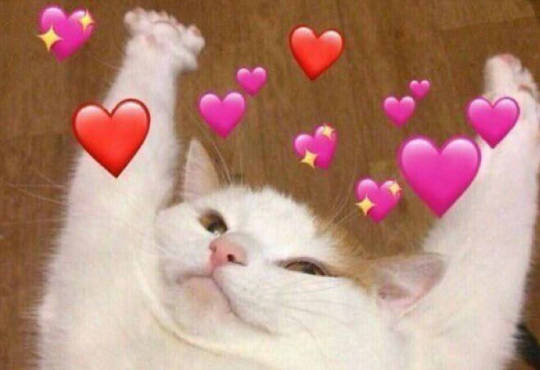
#in this trying time of shippers being stressed over discourse#i offer a gift<3 because i love you guys#and we should spread the love#i want yall to go OFF#tell me every little fuckin thing about zadr that makes ur heart doki OK#LETS GO 👏👏👏#invader zim#zadr#text post#my post#long post
343 notes
·
View notes
Note
HEY WAIT- GENE? WHAT- WHO IS THIS BADASS SWEETHEART? I GUESS IT'S YOUR OC, I LOVE HER, CAN I LEARN MORE PLEASE? 🥺💕 waiting i'm gonna read anything i can with her-
Art by: @senka-mesecine
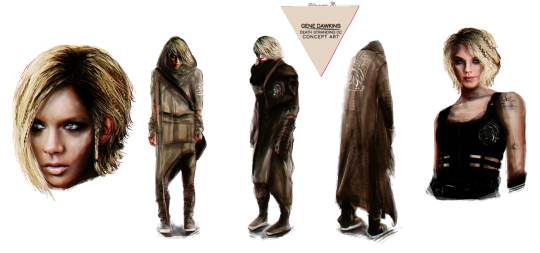
@onl-you I’m glad you asked! Gene is my Death Stranding OC. I came up with her around the time I was conceptualizing my fanfic Sky of Atoms. I’ll give you all ze facts you want, and if you have more questions you’re always welcome to hit me up with more.
Name: Gene Chromos Dawkins
Occupation: Porter for BRISK Harpy--an independent delivery company that primarily works with folks West of the UCA. Has a co-partnership with Bridges.
Age: Late 20s or 30s--I’ve left her age and appearances up to interpretation for readers. I have my own version of how I see her, but I love giving creative freedom to readers to build up the character themselves.
Life Story: Gene was born to parents Linne’ (lynn-ay) and Robert Dawkins in Middle Knot City. Gene’s parents were scientists. Lenne’ focused on botany and plant applications while Robert studied DOOMs, but eventually resorted to working on botany projects with Linne’.
Gene had a good upbringing as a child. She would help her parents out with their plant projects and was taught biology and other sciences, but as she grew older, Gene became different from her parents in both personality and interests. Gene was more into physical work and never stayed in one place for too long. Growing up in a colony, Gene wanted to see the world even with the BTs and other dangers. Being an explorer was her dream job.
As soon as Gene discovered what porters were and found out they got to go outside and see everything, she made it her life goal to become one. During her youth, Gene trained hard physically so she could get her foot in the door to the porter industry. She studied up too on requirements, what sorts of dangers she’d have to look out for, and tests to get a certification.
Gene butted heads with her mother, who wanted Gene to grow up and have a career in a science field because it was a guarantee to have a good life post-Death Stranding. Her father Robert was indecisive, wanting to encourage Gene’s diversity and interests but he too thought Gene would be safer going into a career similar to his and his wife’s.
When Gene had the financial means and hit the requirements, she applied to BRISK Harpy out West. Upon being hired, Gene had a falling out with both her parents. The result ended in a brutal argument where neither party wanted to speak to each other. Sadly, after some time, Homo Demens had obliterated Middle Knot. Robert and Linne’ Dawkins were among the casualties. The loss hurt Gene significantly, and for a while, she felt lost on what to do with her life; thinking of her own mortality, her parent’s lives, and what she truly wanted.
Gene finds out through the grapevine at work about a new UCA project called the Pioneer Program. The program which is part of the Far North Expedition selects strong porters to go up into the region that was once Canada. Upon arrival, they are to catalog if there any survivors and how much the environment has changed after the Death Stranding. It was hoped that after a couple of years, the Chiral Network and UCA can expand up North. Gene decided to make this her goal, figuring it was a compromise between her dreams of being an explorer and doing the science research her parents loved.
In the present and before Sky of Atoms starts, Gene is working on saving up her finances to get a Pioneer Pass to go up North and join the Expedition.
If you want to read up on what happens to Gene and how she gets involved with Higgs, you can read Sky of Atoms here.
Then there is the story Death Stranding: Rewind which is an alternative take on how Gene meets Higgs (based on Higgs saying in SOA how he wishes they could have met in better circumstances)--and the plot of this fic follows Higgs when he was a porter and leads into how he got ensnared into joining Amelie.
Random facts!
I came up with Gene’s name based on, genetics, chromosomes, and Richard Dawkins.
The term gene was introduced by Danish botanist, plant physiologist, and geneticist Wilhelm Johannsen in 1909. This ties in with Gene’s parents being botanists and studying plants.
Linne’--Gene’s mother, was named after Carl Linnaeus. He a Swedish botanist, zoologist, and physician who formalized binomial nomenclature, the modern system of naming organisms.
I originally wasn’t going to have Gene and Higgs end up together in Sky of Atoms, but it kind of evolved on its own.
Gene knows how to draw in good detail because her folks had her sketch and diagram plants as a kid.
Despite being brought up by scientists, Gene doesn’t know too much about anything in the subject. She only held onto key things that would help out in survival situations for when she’d become a porter. Example: learning about wild plants that help heal, cure headaches etc. from her mother.
Gene is quite physically strong, but prefers to outsmart her opponents versus brawl it out, but she’s not afraid to get her hands dirty.
Gene has killed before on the job, and doesn’t like doing it. She especially has a tough time too when it comes to kids.
Gene is indifferent towards kids. She likes them, enjoys their personalities, but being a parent isn’t her goal in life.
Gene can be a bit of a smart ass. It has either helped her out of situations or made them worse.
Below the belt (lolz) is my artwork of Gene.

DS: Rewind appearance in later chapters
Concept Art I did of her


#gene chromos dawkins#gene dawkins#death stranding oc#death stranding#death stranding fandom#thank you for asking about her hon#hope this helps#love ya!#onl-you
17 notes
·
View notes
Text
MORT (1987) [DISC. #4; DEATH #1]
“‘Why did you have to save me?’ The answer worried him. He thought about it as he squelched all the way home. …As he lay shivering in bed it settled in his dreams like an iceberg. In the midst of his fever he muttered, ‘What did he mean, FOR LATER?’”
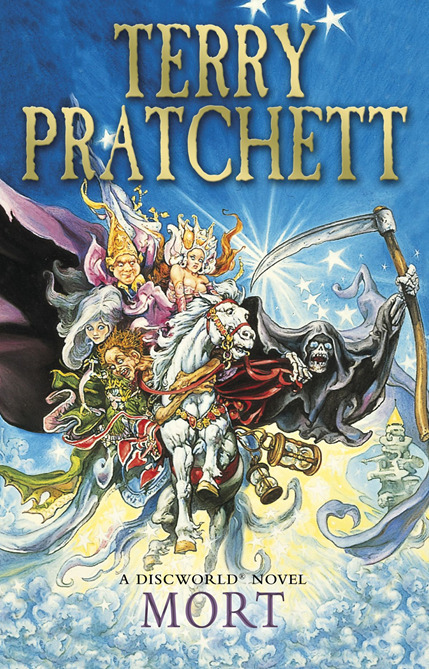
Rating: 6/10
Standalone Okay: Yes
Read First: Sure, why not!
Discworld Books Masterpost: [x]
* * * * * * * * * *
I’m just going to get it out of the way right off the bat: as much as I hate to admit it, the Death books are my least favorite of the Discworld sub-series. (I mean, I still love them, a lot, but I don’t love them as much.) And I know, I know—Death is an excellent character, and I love all of his cameos in the other Discworld books. I love Susan Sto Helit, because I’m a sensible human lady with eyes and I recognize a brilliant, beautiful powerhouse of a woman when I read about her. But the Death books just…aren’t my favorite.
And it’s doubly strange that I still think that’s true, even though Reaper Man might be my favorite Discworld book, depending on the day. It’s definitely top three.
Mort, though, is—kind of boring. Actually, no. Let me rephrase that, without the italics this time: Mort is kind of boring. The story itself is unique, and the concept is fantastically interesting, and I’m almost sad about that. Because Mort, the character, is unimpressive. I spend half the time reading this book wanting to grab him by the shoulders and shake some sense into him. It might just be that he’s a teenage idiot—I do sort of have the same feeling with him (and especially all his interactions with Princess Keli) that I do any time I’m forced to read Romeo and Juliet. It’s a sort of constant, high-pitched, internal shriek of rage and distress.
Stop that! Stop what you’re doing right now! Grow some common goddamn sense!!
But he never does. I am continually disappointed.
Even beyond his regrettable life choices, the kid is just dull. Some early text flavor we get for Mort includes gems such as: “Mort was interested in lots of things. Why people’s teeth fitted together so neatly, for example. He’d given that one a lot of thought. Then there was the puzzle of why the sun came out during the day, instead of at night when the light would come in useful. He knew the standard explanation, which somehow didn’t seem satisfying.”
Yikes, buddy. Yikes. Might as well be interested in watching paint dry.
It’s wild to me that of everyone and everything involved in Mort, Pratchett picked—well, Mort—to be his main character. Mort, who complains that he’s not an ordinary human being living an ordinary human life. He’s got a super awesome thing going for him, given that he’s Death’s actual apprentice, and he wants to be normal and boring? By the time he makes this complaint, he’s already messed up reality and, frankly, a very easy job by being a lovestruck twit over a girl whose eyes he met exactly once across a crowded room—just before her father was brutally murdered. He’s clearly already the king of bad decision-making. It’s baffling that he wants to be even more boring, too.
We’ve got so many cool and interesting characters that we could have focused on instead! Actual, literal Death! Ysabell, his immortally teenage daughter, who’s been sixteen for thirty-five years! We’ve even got Albert, a formerly great and terrible wizard so terrified of death (and Death) that he chose to become Death’s eternal servant rather than die! Any one of those would make a cool as hell main character. We could have had it all, but instead we focus on a dunderheaded teenager, distracted by hormones and totally lacking in common sense.
I get that Mort is acting as a sort of audience surrogate, coming from a vanilla human background, learning as he goes, and only just beginning to move in the occult and magical circles. But I would be about one hundred million times more interested in following Ysabell’s journey from normal human orphan to the never-aging daughter of Death, both rescued and trapped by her father in his land outside of reality, where time never moves and there’s no one to interact with except the stories of the outside world as they write themselves in the library.
She’s a cool goth romantic trapped in the body of a sixteen-year-old for decades. Her favorite thing to do is read real, historical accounts of love stories where everyone dies horribly. Death is her dad and why is this book not about her?
Mort, I’d argue, doesn’t really get interesting himself until he and Death start picking up some of each other’s traits. And even then, if Mort-going-inhuman is cool, it’s overshadowed entirely by Death becoming a person rather than simply an anthropomorphic personification. It’s, just, damn. Death’s arc is beautiful and poignant and has lasting implications for the Discworld. Meanwhile, Mort’s whole…thing…will soon be fridged so that his daughter, Susan Sto Helit, can begin her reign as unstoppable badass and also queen of my heart.
Susan is great. On second thought, I wish this book was about Susan.
Conceptually, everything about this story is wonderful. I love the plot elements, the concept itself is so unique and executed well, and Mort does an amazing job of setting up the rest of the Death series within the Discworld. It’s impossible to read Mort and not think about what it means to be a person—recognizing that everyone must and will die, that there’s no rhyme or reason to it, but also knowing that fighting back against that inevitability is built into us on a fundamental level.
Not yet. Not today. Fairness might not matter; justice might not matter. But part of what makes us human is that we think they should. We want them to.
And, by the end of Mort, Death agrees.
Part of the reason I keep coming back to Mort is that I do like seeing the seeds of what Death will become in later Discworld books. Mort, Ysabell, and Albert—and eventually Susan as well—all give Death the experience and the space to become more than what he was meant to be. Rather than just an anthropomorphic personification, just a thing, Death becomes a person. He has wants and desires and needs, and he acts on them, sometimes despite the fact that it causes problems with The Duty—his literal, actual reason to exist. He grows and changes. He cares.
Compared to the Death we see in The Colour of Magic, who seems relentlessly antagonistic to poor Rincewind—who implies, several times over, that he is actually, actively, trying to kill people himself—the Death we meet at the beginning of Mort is already a relief. He’s perfectly neutral, not threatening at all. He’s an entity who performs a necessary service without any sort of emotion at all. But by the end of Mort, the Death we see is—well, I find him flat-out comforting.
It’s the little things. He goes fishing. He makes jokes, even if they’re creepy and morbid and so specific to his field that most people don’t understand them at all. He likes cats. He’s a good cook.

[Death’s Glory, by Paul Kidby, off his website. Shit, I love his official Discworld art. This, I think, shows his attempt at making a fishing lure that Pratchett describes in a way that seems—nightmarish at best.]
And it’s the big things, too. Death makes mistakes. He plays hooky from his work, which is a bit more impressive when you remember that it’s the literal reason for his existence. He knows right from wrong, and when it comes down to it, I think it’s less important that he chooses to do what’s right over the letter of the law (though I also appreciate that he does), and more important that he can choose at all.
“THERE IS NO JUSTICE,” Death likes to say, “JUST ME.” But when Death is a person, and on top of that, a good person, it almost feels like the same thing.
You have to love the see-saw of Mort and Death going wrong in equal but opposite ways, both of them fascinating (and horrifying). Mort starts losing his humanity as he picks up aspects of Death, leaving him with more and more of the power and knowledge, but none of the steadiness and impartiality that Death has shown so far. And as Death gains humanity, gains personhood, he starts to feel and to understand those feelings.
It’s beautiful to see, but it’s also desperately sad. I think it’s almost cruel to give an emotional range to an undying being who must be there for the end of every life, who must be alone for most of time.
But he gets the good things out of existence, too. Over the course of the Death books, he seems to think it’s worth it more often than it’s not. So it’s a good thing that even after everything’s sorted out and the humans have been given back their normal lives, Death keeps what he has taken.
One of my favorite quotes:
“WHAT IS IT CALLED WHEN YOU FEEL WARM AND CONTENT AND WISH THINGS WOULD STAY THAT WAY? ‘I guess you’d call it happiness,’ said Harga. Inside the tiny, cramped kitchen, strata’d with the grease of decades, Death spun and whirled, chopping, slicing and flying. His skillet flashed through the fetid steam. He’d opened the door to the cold night air, and a dozen neighborhood cats had strolled in, attracted by the bowls of milk and meat—some of Harga’s best, if he’d known—that had been strategically placed around the floor. Occasionally Death would pause in his work and scratch one of them behind the ears. ‘Happiness,’ he said, and puzzled at the sound of his own voice.”
While Death moves more and more towards being a person, Mort goes the opposite way, and I, reluctantly, have to agree he’s right to give it all up and go back to being purely human. As conceptually cool and interesting as it is to be apprenticed to Death, to be more powerful and more real than any other living person, people aren’t meant to live like that, and certainly not meant to live forever. Mort understands that.
As Death says, “YOU COULD HAVE HAD ETERNITY.”
And in reply: “‘I know,’ said Mort. ‘I’ve been very lucky.’”
Honestly, in the course of writing this all out, I’ve almost talked myself back around to really loving this book. It’s got everything we all want from a Discworld novel: exquisitely crafted and delivered puns, punchy and memorable quotes, unique and well-written characters in a unique and well-crafted setting, a perfect blend of humorous absurdity and heart-wrenching sincerity. And unlike the first few Discworld books (especially The Colour of Magic, but I’d include all of the previous three novels), Pratchett is clinging less to established High Fantasy tropes and relying more on Discworld-specific flavor. Ankh-Morpork feels more and more like a real place with every visit, and even the other regions of the Disc come across less as never-explored, baffling and bizarre foreign lands (Here There Be Dragons!) and more as places that really do exist, even if we haven’t seen them personally just yet.
And, if nothing else, Mort is so, so important to the rest of the Discworld books from this point on because it establishes exactly what and who Death is on the Discworld. He’s a person. He is, at his core, good. And maybe, as Death says, “THERE IS NO JUSTICE, JUST ME,” but I think it’s incredibly reassuring while reading the series to know that no matter how badly things go wrong, no matter how much danger our Discworld heroes are in or how nerve-wracking things get, the absolute worst thing that could happen is that they end up in Death’s hands. And Death will treat them as they deserve.
I will always appreciate Mort for that peace of mind. (And I can appreciate Mort for it, too, even if I still want to grab that ding-dong dumbass by the shoulders and just shake—ahem. Sorry.)
* * * * * * * * * *
Side Notes:
I need everyone to read this quote about a party at the Patrician’s palace and join me in my confusion: “In fact some two hundred of the Patrician’s guests were now staggering and kicking their way through the Serpent Dance, a quaint Morporkian folkway which consisted of getting rather drunk, holding the waist of the person in front, and then wobbling and giggling uproariously in a long crocodile that wound through as many rooms as possible, preferably ones with breakables in, while kicking one leg vaguely in time with the beat, or at least in time with some other beat.”
Vetinari let them do WHAT
Sure, he’s not technically Vetinari yet, he’s never been named at all, but that’s still proto-Vetinari’s guests at proto-Vetinari’s house and he’s letting them do WHAT
Rincewind pops up briefly in this book, serving as an assistant to the Librarian. Is this an important cameo? No, probably not. Does it make me smile down at my book like I’m seeing a long-absent friend, even if there’s only been one book so far in the series that does not include him? Absolutely, yes. Hi, Rincewind! Missed you, buddy! See you in a minute, Sourcery is coming up next!
Ysabell and Mort have such a strange love story.
“‘I don’t want to get married to anyone yet,’ he added, suppressing a fleeting mental picture of the princess. ‘And certainly not to you, no offense meant.’ ‘I wouldn’t marry you if you were the last man on the Disc,’ she said sweetly.”
“‘Obviously we shouldn’t get married, if only for the sake of the children.’ Mort nodded.”
“DAUGHTER, EXPLAIN YOURSELF. WHY DID YOU AID THIS FOOL? Ysabell curtsied nervously. ‘I—love him, Father. I think.’ ‘You do?’ said Mort, astonished. ‘You never said!’ ‘There didn’t seem to be time,’ said Ysabell.”
Teenagers. Honestly.
We get a lot more discussion about belief and reality in this one—Mort himself kind of embodies the point as he becomes “more real” and begins to stroll through walls, or doors, or arrows. Nobody can see Death wandering around the mundane world (with the exception of cats and the magical community) because nobody expects to see him; they don’t believe he’ll be there, and so they don’t see him. Princess Keli died, according to history, so even though Mort “saved” her, history (and the population of her kingdom) start to write her out. Belief = reality. We change the world with the force of that belief.
Favorite Quotes:
“I? KILL? said Death, obviously offended. CERTAINLY NOT. PEOPLE GET KILLED, BUT THAT’S THEIR BUSINESS. I JUST TAKE OVER FROM THEN ON. AFTER ALL, IT’D BE A BLOODY STUPID WORLD IF PEOPLE GOT KILLED WITHOUT DYING, WOULDN’T IT?”
“Let’s just say that Ankh-Morpork is as full of life as an old cheese on a hot day, as loud as a curse in a cathedral, as bright as an oil slick, as colorful as a bruise and as full of activity, industry, bustle and sheer exuberant busyness as a dead dog on a termite mound.”
“‘How do you get all those coins?’ asked Mort. IN PAIRS.”
“‘Are you going to send me home?’ he said. Death reached down and swung him up behind the saddle. BECAUSE YOU SHOWED COMPASSION? NO. I MIGHT HAVE DONE IF YOU HAD SHOWN PLEASURE. BUT YOU MUST LEARN THE COMPASSION PROPER TO YOUR TRADE. ‘What’s that?’ A SHARP EDGE.”
“They’re always telling people how much better it’s going to be when they’re dead. We tell them it could be pretty good right here if only they’d put their minds to it.”
“It had been a long afternoon. The mountaineer had held on to his icy handhold until the last moment and the execute had called Mort a lackey of the monarchist state. Only the old lady of 103, who had gone to her reward surrounded by her sorrowing relatives, had smiled at him and said he was looking a little pale.”
“Logic would have told Mort that here was his salvation…Logic would have told him that interfering with the process a second time around would only make things worse. Logic would have said all that, if only Logic hadn’t taken the night off too.”
“‘Why did you have to save me?’ The answer worried him. He thought about it as he squelched all the way home. …As he lay shivering in bed it settled in his dreams like an iceberg. In the midst of his fever he muttered, ‘What did he mean, FOR LATER?’”
“‘I mean, friend or foe?’ he stuttered, trying to avoid Mort’s gaze. ‘Which would you prefer?’ he grinned. It wasn’t quite the grin of his master, but it was a pretty effective grin and didn’t have a trace of humor in it. The guard sagged with relief, and stood aside. ‘Pass, friend,’ he said.”
“The sword burned icy cold in his hand, dragging him on in a dance that would not end until there was nothing left alive. And that time came, and Mort stood alone except for Death, who said, ‘A fine job, boy.’ And Mort said, MORT.”
“‘I think there’s something you ought to know,’ said the princess. THERE IS? said Death. (That was a cinematic trick adapted for print. Death wasn’t talking to the princess. He was actually in his study, talking to Mort. But it was quite effective, wasn’t it? It’s probably called a fast dissolve, or a crosscut/zoom. Or something. An industry where a senior technician is called a Best Boy might call it anything.)”
#discworld#mort#death#hey if you read this and like this maybe look at my other ones#and come talk to me!#I'll be writing more of these#aiming for about a book a week#and I'd love to hear what people think
3 notes
·
View notes
Text
An idea for a Poke-clone
So since Pokemon day just passed, I started to think about a kind of Poke-clone type of game/series of my own, since that seems to be an upcoming trend. I already thought up the base idea for my own Pokemon region before, and I’m not sure if I’ll eventually combine that idea with this one, but anyways…
The very broad idea is that it’s sort of the best of Pokemon, mixed with the best of Digimon, and I guess for fun’s sake we could say it’s sort of got a Bionicle flair to it a bit too.
I feel like there are some conceptual pitfalls in Pokemon that they’ve sort of tried to step across over time, that obviously aren’t too big a deal but I can probably fix with this idea. The big one that hurts them in the real world is that, by the Pokemon being presented like animals or pets, it makes battles feel like some kind of unethical dog fighting at first glance. Obviously they make it seem like Pokemon have personalities and minds like humans, in that they do genuinely want to battle, and that they genuinely like and want to fight with their trainers, which is fair, but it also begs into question other things, like why they’d want to sit on the floor and eat brown pellets out of bowls instead of on plates with actual food like the humans. Also, it makes you wonder why they even want humans to tell them what to do. In the wild, they can clearly fight on their own, so why do they instantly do what humans say when they’re caught? I guess the assumption is that humans are better with strategy, but even better than Pokemon like Alakazam or Metagross, who are supposed to have superior intelligence? Also, when a Pokemon is given to another trainer, like in the opening of the Deoxys movie, why does it not do anything and wait for its new trainer to tell it what to do, even when it’s being bombarded with attacks, and with its trainer clearly frozen in shock?
Also, back to the idea of catching, what makes the Pokemon want to obey the trainer? At first it almost seems like Pokeballs brainwash the Pokemon into liking whoever catches it, but what about Pokemon like Ash’s Charizard, who don't obey trainers? In the games it’s related to badges, but then why would any Pokemon obey a trainer without any badges? Do they just accept that it’s their lot in life to be caught by a human, and when that happens, you just obey them if you’re not good enough yourself? Obviously a decent amount of Pokemon just become friends with a human, and then they catch them just out of a formality. But, what about Go in the most recent season of the anime? He just catches anything he sees instantly, without much of a fight at all, and he has no badges, so how can he just instantly use anything he catches? Surely not every single Pokemon they come across just wants to bow down to him instantly. Obviously a lot of this lore stuff is just in the background, since the primary purpose is gameplay and whatnot, like Go just sort of representing the catching style of Pokemon Go, and with badges being a logical progression that keeps you from just using the strongest Pokemon traded from a friend and wiping the game clean. Still, even if you just accept it, it’d be nice to just not have to accept it, you know?
Then in terms of design, I kind of like the prospects of Digimon a bit more. Visually, though, I think Digimon are universally worse looking than Pokemon, but the fact that they seem more like friends than pets solves so many problems. First, that they’re made out to be actual sentient (sapient if you want to be pedantic about it) beings, instead of animals. This makes it so much easier to understand why they’d want to fight and protect their less-than-capable humans, and why they’d be willing to fight at all. They’d just understand it’s basically a sparring match or a sport. Also, it makes the humanoid designs so much easier to think about. When you see that classic image of Mimey sitting on the floor picking at the “Pokemon food” from a dog bowl alongside the rest of the Pokemon, it just doesn’t feel right.
Also, what the hell are humans in this world? Why are Pokemon regarded as such special beings in the world? They always say “Welcome to the world of Pokemon” like they know of a different world full of non-Pokemon, and that Pokemon aren’t just animals. It almost made more sense in the first few seasons of the anime, where you’d just see some random fish swim alongside Magikarp or whatever. That made it clear that there are normal animals as well, showing that Pokemon are separate things entirely. But, now, they’ve retconned that, and I don’t think that was how the games worked in the first place at all. Then, the age-old question that all the Youtube game theorists try to answer: Are humans Pokemon? They sure seem resilient to Pokemon attacks, but don’t have any themselves, apart from like Tackle or whatever. It feels like animals were a thing way back when, but through natural selection the animals that developed supernatural power obviously became the dominant species, and over time the supernatural animals were called “Pokemon,” and humans with their technology/taming abilities managed to survive the onslaught of dangerous creatures by using them as protection from others. Then, I guess way down the line humans can’t keep up and die out, creating the Mystery Dungeon series, since it’s strange how the Pokemon there seem to know what humans are despite them never existing in the series. That, or maybe Mewtwo just fuses people with Pokemon like he did in the Detective Pikachu movie.
Anyway, enough of me talking about stuff probably explained in the manga or whatever. Here’s the Poke-clone idea:
The creatures were there first, and at least most of them have human-level intelligence, if not higher-level intelligence. There are some supernatural animals around, alongside supernatural people and monsters, and there are 7 primary elements they can have: Earth, Fire, Water, Electricity, Air, Light, and Dark. Earth is basically Earth in Temtem, Fire/Water/Electricity/Air are all self-explanatory, Light is basically a more generalized Fairy type, and Dark is like Dark but with also including Ghost. These creatures can be born with any of these types, and can naturally wield them, getting better at it as they grow. But, these types can be combined using elemental essences, creating new types. Earth and Fire creates Metal (because smelting), Light and Earth creates Crystal (Again think Temtem, just can’t get enough of it) Water and Dark create Ice (because ice does feel different enough to be separated from water elementally imo) Fire and Water creates Air again (“steam” doesn’t feel special enough) and Electricity and Fire creates Plasma (basically generic magic). Chances are I’ll think of more combinations but whatever. There are different areas themed after these elements, and in these areas a specific element is boosted in power, so the “gym” equivalent will reside in these places, and “badges” will prove that you can defeat an element at its strongest level. Also, the areas that connect the main areas either double up types or use the secondary type which they combine into, so not all “gyms” would be super straightforward.
Here’s where humans come in, though. They’re not just “humans.” They’re actually a species of these creatures called “Humans” (capital) and are mythical beings which did not originally exist on the world. Originally, it was just the other creatures. At that point, humans were only a myth spread around as myths do, and they were said to be creatures with the ability to combine every primary type and use them simultaneously, being the most powerful species of creature of them all. However, when they did magically appear on Earth, they seemed awfully weak. In fact, they couldn’t wield any element naturally, but could by using elemental essence, which is just normal for creatures. Some thought they just needed to be trained and grow like the rest of them, but others just saw the myths as being dramatic. It was especially troubling to see Humans grow and die of old age without being able to use that mythical power. Regardless, many Humans were highly respected, and many teams of these creatures would look to them for guidance during battle, even though there are many teams that don’t even have a Human on them. Humans, of course, are expected to battle alongside their teammates, even if they’re not quite as capable, because that’s how their society is expected to work.
Over time, everyone sort of let go of the idea that Humans are somehow superior and they just became equals, although the trend of Humans advising a team stuck for the most part (partially because they can’t do much else, they wanted to feel inclusive). Even with their normal social standing, though, some creatures scoffed at them claiming they’re not even worth having on a team at all. Others tried their best to draw out the mythical Human power, sometimes by capturing and experimenting on them in less-than-ethical ways. Some of them claim it’s helping them draw out their full potential, but others unabashedly say that they want to harness the Human power for their own good.
So yeah, that’s basically the lore of the idea. I’ll probably think of a specific Pokemon-Digimon-Temtem-esque name equivalent for them eventually, but for now let’s just call everything a “creature.”
The overall design prospects of the creatures are basically at the same level as Pokemon, where some of them are clearly inspired by animals but others are just general monsters/humanoids. I’m not entirely sure if I want them to all be intelligent or if some should still be animal-like in behavior, but the latter definitely makes more sense world-wise. The areas the creatures live in are built up using the elements they wield, obviously. I could imagine the general usage of the elements being more like Avatar in a way, but obviously with more than the base four elements.
As for the elements, any individual creature would start out in only one of the primary elements, and I guess if you beat a “gym” you’d get the essence for that gym element, essentially unlocking new types for your team. You can use each essence infinitely, and outside of battle the form of the creature you use it on would permanently change if it creates a secondary type (until you use another one). However, in a battle, you can switch them on the fly, and they will revert back to however they were before the battle. I’m also thinking that they could only be used on a creature if they create a secondary type, and I’d just add more of those in so it’s less limited, and so not every creature has the exact same potential, which would make recruiting different ones just pointless (although I can see it being useful for just choosing your favorite creatures to fight with, so no loss either way). Maybe the effects could just be timed in a battle. Also, secondary typed creatures would be a different form entirely. So, if an Earth creature was given Fire essence, they’d go from looking like they’re made of stone to being made of steel, etc and etc. Think of it sort of like character customization. For the Human you’d inevitably play as, I guess you could just change their hair/eye color depending on the essence, maybe add some special particle effects or light textures on the skin.
Thematically, this is more like a tag-team sport than a battle. In a 1v1 or 2v2 scenario, you’d tag out with your teammates, since the term “tag” makes for a good reminder that everyone involved is working at the same level as you pretty much. You could also name your team as well, making it even more sport-like. Also, instead of “capturing” teammates, you’d just recruit them, logically by proving yourself in a battle. Maybe you’d have to fight them only with you as a Human so it’s much better proof that you’re a worthy leader. It also opens the possibility to just talk with NPCs and recruit them that way. Maybe you could even recruit different Humans with different body types, and therefore different stats. I guess the trouble would be how you’d keep them all by your side at all times. Maybe there could be some Telefang-esque communication device you’d use to call in the specific members of your team you’d want in your battle.
Gameplay-wise, it would definitely be cool if it were a much more live battle like Kindred Fates, where you’re controlling the active creature and using their moves on the fly. It would also make for fun multiplayer battles, where you could even have a full team go against another all at once, in a sort of battle royale. Maybe even have a true BR. Even though visually I’d love for it to be like Pokken Tournament with the circular battlefield and movement (no switching, just normal movement all the time), I definitely think having super limited and easily understandable movesets is better for having multiple teammates.
The main story of the game is sort of set out by the lore, too. Naturally it kind of has a “chosen one” protagonist who’d inevitably bring out the mythical Human power over the course of the story, with the people trying to capture you and stuff for that power being the evil team analog. Also, for those Pokemon fans anal about having an asshole rival, they could easily be a team of only creatures that doubts Human abilities. The “gyms” being for each type is pretty standard, and having combo “gyms” definitely makes things more challenging. Maybe you could enter the “league” at the end only once you get all the essences, and the secondary type “gyms” are just for a challenge.
I’m not sure if I want the overall age of the world to be more modern, but there would definitely be certain areas that are more ancient-looking. That’s basically why I thought the idea was a little Bionicle-like, because they have super ancient-looking areas that are themed but also have a weirdly cool degree of technology in them. It’s a seriously cool aesthetic that I want more of, but I guess certain towns and cities could keep a modern structure (roads, buildings, shops, etc) but with drastically different building designs based on the relevant element. Surely with such crazy elemental powers they wouldn’t need crazy technological transportation, but maybe that would be for the Electric elemental cities. Surely some Humans would need something to be proud of.
Obviously the biggest selling point for Pokemon (at least for me) is the monster designs, so I’ll probably put some stuff together in the future. Right now I can see there being some sort of tall Metal knight-like lady character who carries their Human around like a baby. That is, it’d be her character, and not a thing of the species. Also, I drew a cute fur seal pup recently that could easily be worked into one of these creatures. Designing monsters is too fun as is so giving me a good reason to do it is just perfect.
Of course, as is common with ideas that literally were thought up yesterday this isn’t going to be a thing unless some millionaire game designer contacts me right after posting this so yeah, I’m just spitballing right now. Spitballing is fun, though.
#pokemon#clone#pokeclone#idea#thoughts#rambling#monster#poole#etc#ideas#digimon#temtem#kindred fates
1 note
·
View note